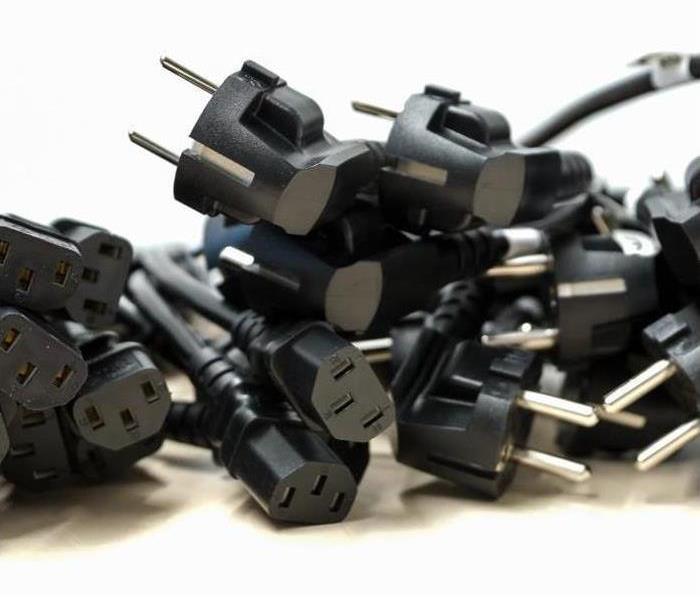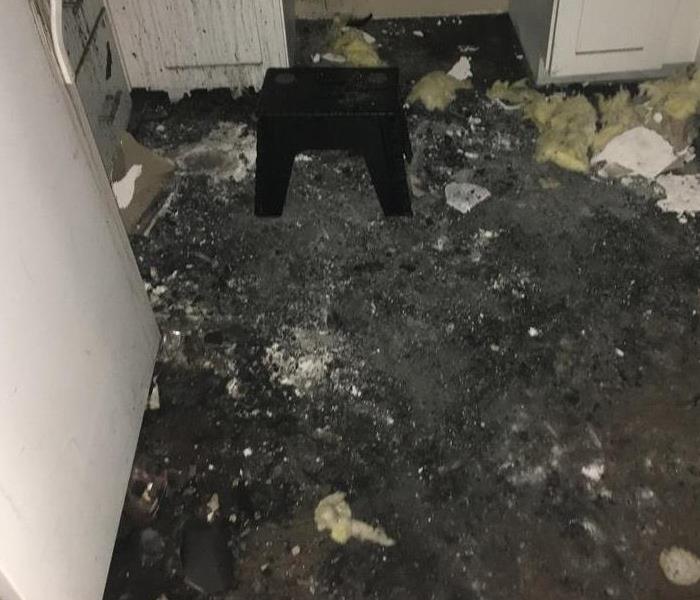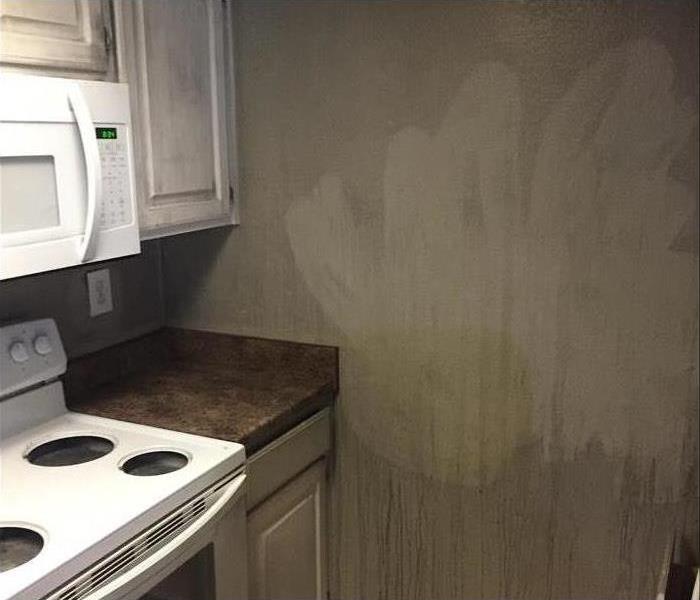Recent Fire Damage Posts
9 Tips for Fire Damage Prevention
1/5/2023 (Permalink)
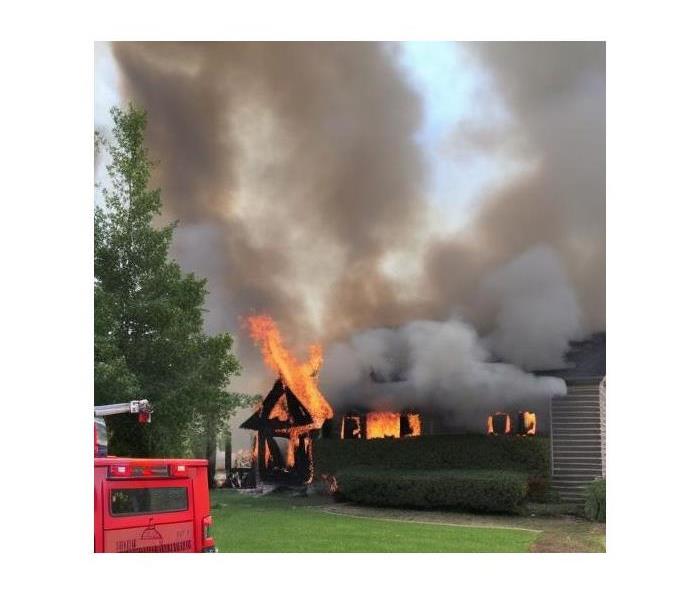 How you can prevent housefires.
How you can prevent housefires.
As a homeowner, you want to safeguard your investment from potential harm — but do you know exactly how to keep it safe from the risk of fire damage? Although fires can still happen due to circumstances beyond our control, there are many steps that homeowners should take in order to ensure fire damage prevention or minimize possible destruction caused by a fire. In this blog post we'll cover some tips on how you can protect your home and family from potential fire damage. Read on for ways you can help lower the possibility of experiencing heartache and costly repair bills!
1. Make sure your fire detectors and smoke detectors are always in working order
Test your smoke alarms regularly and change their batteries at least twice a year. You can use a broom handle or a long stick to press the test button, which helps you avoid having to climb up onto the ladder. Make sure the sound that is emitted is loud enough for all members of your family to hear it.
It's important to check smoke detectors regularly, as they are the first line of defense against fire damage in your home. Smoke detectors can detect fires when they start and alert you so that you have time to evacuate before it gets out of control. This early warning system is invaluable, as it can save lives and minimize property damage. A working smoke detector will give you peace of mind knowing that your family is safe from potential danger due to a house fire. In addition, checking the battery life on your smoke detectors is essential for ensuring their efficacy; dead batteries won't be able to warn you if there are fire hazards in the house. Therefore, regular maintenance and testing of these devices should be done at least twice a year –– once during daylight savings time and again six months later –– so that everyone has enough time to get out safely if an emergency occurs.
2. Educate yourself and your family about fire safety precautions
It is important to educate your family about fire safety precautions so everyone knows what steps to take in the event of a fire. This education should include information on how to prevent fires, such as not leaving things like lighters or matches lying around and making sure all electrical outlets are properly covered. It should also include instructions on how to evacuate safely if a fire does occur, including teaching children when and where to go during a fire drill. Additionally, families need to practice an escape plan from their home several times each year so that everyone can remember what they need to do in the event of an emergency. By taking these simple steps, you can help ensure your family’s safety and avoid fire hazards.
3. Keep an eye on candles and other open flames
It is incredibly important to be vigilant when it comes to candles and open flames, as they can easily create a hazardous fire situation in your home if not monitored properly. For starters, any candle should always be placed on a stable, non-flammable surface that is away from anything that could potentially catch fire such as curtains or furniture.
4. Regularly check for frayed wires or damage for fire hazards.
In order to check for damaged electrical cords, homeowners should inspect their electrical cords regularly to make sure they are not frayed or damaged which could catch fire. Careful visual inspection is important, as even the smallest frays in the wires can increase the risk of electrical fires. Homeowners should also look for signs of wear and tear on the sheathing that surrounds the electrical cord.
5. Have a fire escape plan and practice it regularly with your family
Creating a fire prevention escape plan is an important step in keeping your family and home safe from potential fire damage. Having an established plan of action will help ensure that everyone knows exactly what to do if the unthinkable were to happen. With proper planning, you can make sure that your family is prepared for any emergency situation involving a potential fire hazard.
6. Store flammable materials like gasoline in a safe place away from the house.
It is important to store any flammable materials such as gasoline, paint thinner, and other combustible liquids away from the house. Not only can these materials be dangerous if they are not stored properly, but they can also increase the risk of a fire in your home. By keeping them outside or in an approved container away from your home and family, you can help reduce the chances of a fire occurring due to improper storage. And always keep a fire extinguisher nearby.
7. Regularly inspect your space heaters within your home to prevent house fires.
Ensure your space heater has been approved to meet safety standards with an Underwriters Laboratory (UL) certification sticker. Look for a label that displays the type of heating unit, such as “electric space heaters” or “gas-fired space heaters” so you can be sure the device is safe for use.
When using a space heater inside your home, it is essential to place it in a location that will minimize the risk of causing a house fire. A space heater should never be placed near curtains, furniture, bedding, or other combustible materials as these items can easily catch fire. Additionally, any flammable liquids should be kept away from any space heater.
8. Key Safety Measures That Homes Should Take to Avoid Grease Fires
Grease fires can be incredibly dangerous and cause significant damage to any home. Fortunately, there are several key safety measures that homeowners can take in order to reduce the risk of a grease fire occurring. These include never leaving cooking unattended, keeping an eye on hot surfaces such as stoves and grills, avoiding using water to put out a grease fire, and storing flammable materials away from the house. By taking these steps and being vigilant about potential hazards in the kitchen, you can help ensure that your family stays safe from a potentially disastrous situation.
9. Ensure Safety in Your Home by Keeping a Fire Extinguisher Handy at All Times
Having a fire extinguisher in the home is an invaluable tool for preventing or minimizing the damage caused by a fire. It is essential that homeowners have an appropriate extinguisher on the premises and that it is regularly checked and serviced. Fire extinguishers are classified according to their purpose and should be chosen depending on the type of fire.
We hope you never have to experience a fire in your home or business, but if you do, know that SERVPRO® is here to help. We are open 24 hours a day and can be on-site within four hours to begin quick mitigation services. Our trained technicians use advanced equipment and techniques to restore property destroyed by fire quickly and thoroughly. Call us at 916-966-2601 as soon as possible after the fire so we can get started helping you with the cleanup and restoration process.
5 Tips to Protect Your Home from Fire Damage During Wildfire Season
6/29/2022 (Permalink)
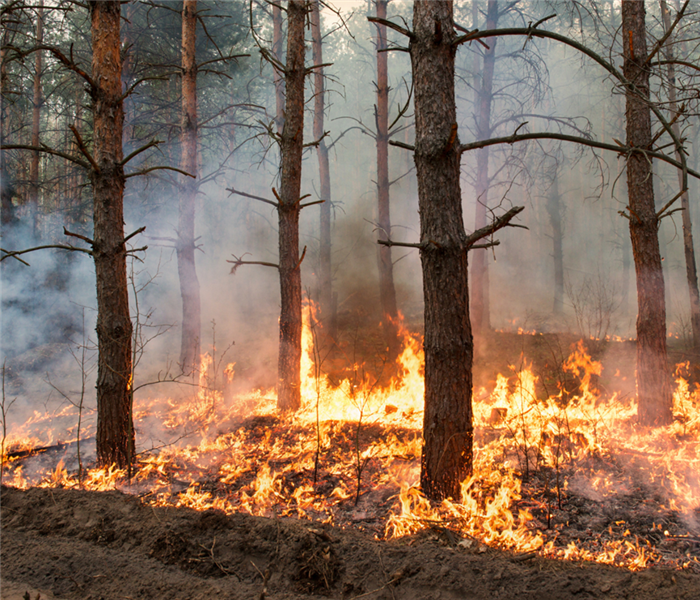 How can you protect your home from fire damage during wildfire season?
How can you protect your home from fire damage during wildfire season?
Unfortunately, wildfire season doesn’t end when summer does; it only ramps up. If you live in an area that has been affected by wildfires in the past or that runs the risk of wildfires year-round, you know how devastating these natural disasters can be to your home and property. How can you protect your home from fire damage during wildfire season?
Here are five tips to protect your home from wildfires
1) Keep your gutters clean
Over time, debris can find its way into your gutters and downspouts. This can create a hazardous situation by increasing your chances of catching fire to your roof. Keep your gutters clean so you’re doing everything you can to protect yourself from wildfires. Stay up-to-date on fire safety updates: When it comes to wildfire prevention, the most important thing is to be aware of what's going on in your area. As soon as there are any changes in air quality or the weather forecast, take the appropriate steps. Be ready for anything: It's important that you have all the resources you need before it's too late.
2) Clean up piles of leaves, branches and other combustible materials
Piles of combustible materials that have accumulated around your home are one of the easiest ways for fires to start. Also, clear out your gutters and make sure they aren’t full of debris. The same goes for your yard; be sure it’s free of trash, leaves and overgrown brush.
3) Clear flammable items away from exterior walls
Wood, leaves, and trash close to your house is highly flammable—and it’s often on fire before you even realize there’s a problem. Be aware of these items and remove them as soon as possible if they are a risk to your home. Ensure that all the vents and outlets in your attic have screens: A fireplace chimney can act like a smokestack and create heavy smoke during fires. Consider installing metal or metal-lined windows: More expensive than traditional windows, metal or metal-lined windows will protect against radiant heat from a wildfire more effectively than regular glass windows.
4) Create a defensible space around your home
There are some things you can do to reduce your home’s fire risk. One of them is creating a defensible space. A defensible space is an area cleared around a structure (usually at least 30 feet wide) that's free of dead wood, low-hanging branches and other combustible materials. By creating a defensible space around your home, it gives firefighters greater access to your house in case there's an emergency, so they'll be able to put out any fires more quickly.
5) Check your insurance policy
Before wildfire season begins, make sure you have an adequate homeowners insurance policy. You may find that your current policy doesn’t have sufficient coverage for damage caused by wildfire. It is important to know what your policy covers and what type of additional coverage you need. Check with your insurer or agent if you have any questions about what is covered and not covered by your current homeowners insurance policy. You may be surprised!
4th of July Fire Safety Tips to Keep Your Home and Family Safe
6/27/2022 (Permalink)
 Many people take the 4th of July as an opportunity to let loose and enjoy the fireworks, it’s important to keep safety in mind while celebrating!
Many people take the 4th of July as an opportunity to let loose and enjoy the fireworks, it’s important to keep safety in mind while celebrating!
It’s that time of year again! While many people take the 4th of July as an opportunity to let loose and enjoy the fireworks, it’s important to keep safety in mind while celebrating this holiday. As one of the leading fire restoration companies in the country, we at SERVPRO of Citrus Heights/Roseville, and Carmichael want to offer some tips that will help you keep your home and family safe during this exciting time.
The Dangers of Sparklers
First and foremost, let us discuss the infamous sparklers, a kids favorite and usually the start of the festivities. Not many parents realize how dangerous sparklers can be around children. Sparklers are actually classified as fireworks, but because they’re so small, their dangers aren’t well-known. Sparklers burn at more than 1,200 degrees Fahrenheit – more than 700 degrees hotter than your oven! Sparklers should only be used under adult supervision, and never by small children.
Prevent Fireworks-Related Injuries
Although firework safety is a big concern for many people, accidents can still happen. It’s important to be aware of all related risks so you can protect your home and family from injury. Some tips include - Never allow children to play with fireworks unsupervised. - Store fireworks in a cool, dry place away from any structure or flammable materials (including other fireworks). - Only use fireworks outdoors; never shoot them indoors or near any structures. - Read and follow all directions on every product label before using it.
Limit Alcohol Consumption
Alcohol can increase your risk for fire, so be careful with how much you drink at your 4th of July celebrations. In addition, if you’re already intoxicated, don’t go near matches or lighters. Stay in control of your faculties—no matter how tempting it may be to let loose. Safety is so important, especially on this day.
Clean Up Afterwards
When you’re done celebrating, make sure you put your firework debris in a safe place. The EPA recommends collecting fireworks in a bucket of water, making sure they don’t dry out before disposal. Remember that fireworks are made from explosive compounds, so keep them far away from kids and pets! All in all, have a great 4th of July and be safe!
5 Tips to Protect Your Home From a Fire
6/20/2022 (Permalink)
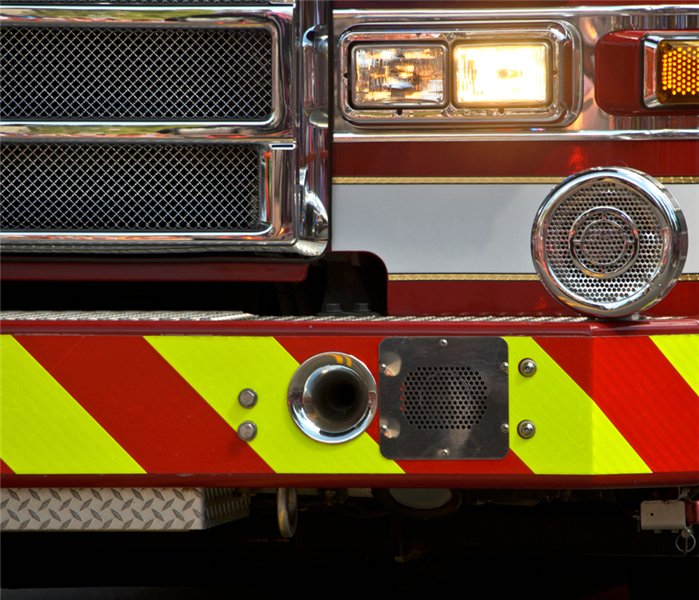 5 tips to protect your home from fire
5 tips to protect your home from fire
When it comes to residential fires, you don’t want to find yourself unprepared. It only takes one unattended candle or a spark from the fireplace to start one of these fires, and once they get started, they can spread quickly, causing extensive damage to your home and belongings. To avoid finding yourself in this situation, use these five tips to protect your home from fire.
1) Check Smoke Detectors
Smoke detectors save lives and can minimize fire damage. Always check that they are functioning properly—you should do it monthly and after every power outage. If you notice any irregularities with your detector, have it checked by a professional immediately. And always be sure you know where all of your detectors are located so you can react quickly in an emergency.
2) Keep an Exit Plan in Mind
Developing an exit plan for your home will keep you, your family and your pets safe from fire damage. Fire safety experts recommend everyone have a family escape plan at all times; know two ways out of every room in your house and make sure that you’re familiar with them. The last thing you want is to panic in an emergency situation, so spend some time becoming acquainted with your house layout and planning escape routes.
3) Do Not Leave Cooking Unattended
Whether you’re boiling water for tea or cooking dinner, it’s easy to get distracted. Even short periods of inattention can lead to disaster. To keep your home safe from fire damage, keep that stovetop covered and never leave cooking unattended.
4) Keep Matches Away from Children
The leading cause of fire-related injuries in children is igniting matches. Don’t allow children to use lighters or strike matches, even if they appear old and dry. Keep all matches out of sight and away from young kids who might play with them or try using them as toys.
5) Store Lighters and Candles in Safe Places
Keep lighters and candles in locked cabinets or on high shelves, away from children. Be careful with matches—keep them away from children as well. When you’re done using them, put them out completely by dousing with water. If you have a gas stove, don’t light burners with the pan on top—the flame could jump onto your countertop and start a fire. Unplug appliances when they aren’t in use; never leave them running while you sleep.
How a Fire Can Impact your Business
1/27/2022 (Permalink)
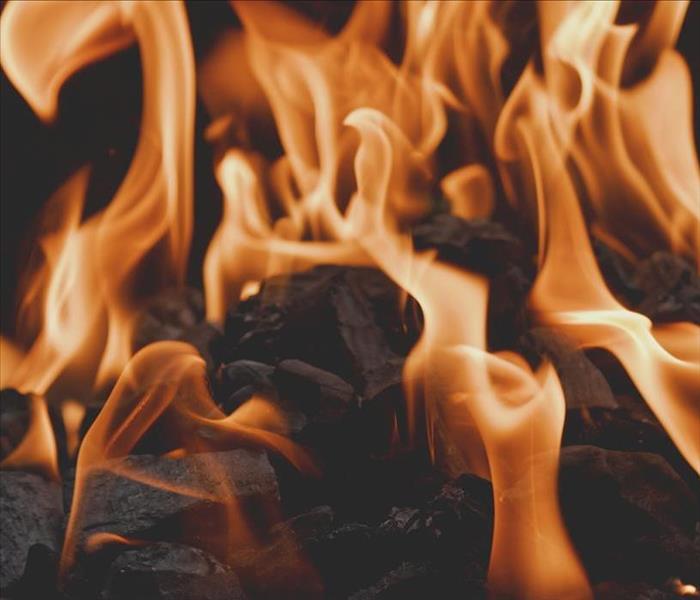 At the beckon of your call, SERVPRO of Citrus Heights/Roseville, and Carmichael are ready to help you plan,
At the beckon of your call, SERVPRO of Citrus Heights/Roseville, and Carmichael are ready to help you plan,
You have to be prepared and consider the possibility of a fire outbreak in your business, having a plan to tackle it firsthand. There are alarm systems that'd help you detect a fire early and tackle it immediately before it escalates, but that is not enough.
Explained below is how fire can impact your business and guides to help you consider and make plans before a fire outbreak occurs.
The impact of a fire in businesses include:
Property or Stock Loss
The chance of recovering a property damaged by fire is very slim. You not only lose valuable assets but valuable documents as well. All documents in the office computers are not retrievable except those stored in the cloud (online). It may be impossible to resume work without some archived documents.
Insurance Claim Issues
If your business is insured, the insurance company will confirm compliance with the fire safety regulations and recommendations. If there's a compliance issue, insurance may be denied. Business owners will be responsible for the cost of repair and replacement of these properties. On the other hand, the insurance company will have to investigate and bear the cost of repair and replacements after validation, but this takes time.
Financial Loss
Business owners don't consider the financial implications of a razed property. When a fire razes a building, it results in a financial loss of all engulfed properties. The cost of repairing, rebuilding, and replacing burnt items can be pretty high.
Halt in Business Operations and Revenue
A fire is capable of hindering the operational functionality of a business. It also leads to losing clients or customers as clients will take their businesses elsewhere. There may be no new revenue instead of incurred expenditure.
There could be human casualties like injuries or death in a fire. Smoke from the fire can cause health problems as well.
Mitigating Fire Outbreak in a Business
Equipping business spaces with adequate fire safety systems goes a long way to mitigate fire outbreaks. Keep fire extinguishers in strategic places to use to quench the early fire. Smoke alarms are very effective in issuing warnings before fire escalates.
Most importantly, consult a professional to help plan and install fire safety systems. At the beckon of your call, SERVPRO of Citrus Heights/Roseville, and Carmichael are ready to help you plan, implement, and resolve any fire service you require. Contact us today for emergency services and consultations; let's help safeguard your business.
Health and Safety Tips During Fire Damage Restoration and Cleanup
9/22/2021 (Permalink)
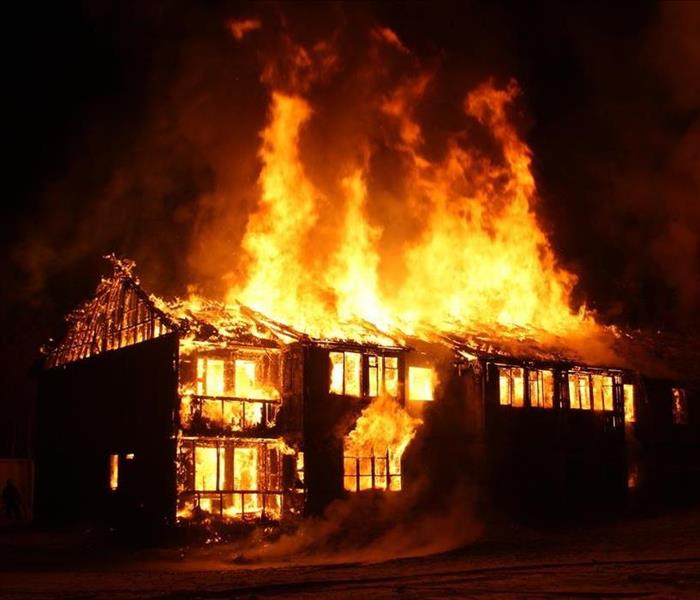 A fire not only destroys your home, but it also destroys many other valuable items and prized possessions.
A fire not only destroys your home, but it also destroys many other valuable items and prized possessions.
According to the Fire Protection Research Foundation, fires cost Americans about billions and billions of dollars. Aside from wildfires, there are also house fires caused by faulty electrical wiring and simple accidents, both of which can be physically traumatic.
In addition to possible physical casualties, fires can cause substantial emotional trauma. A fire not only destroys your home, but it also destroys many other valuable items and prized possessions. The house is, above all, a place of protection, comfort, and safety for you. Following a fire, this sense of security can be lost, causing severe disruption to daily life.
To ensure your health and safety while dealing with the damages fire has caused you, follow our recommendations below:
Do not enter the damaged property
No matter the amount of damage, do not enter the property. And find a safe play to stay. After the flames have died down, the substances remain for days or even weeks. Entering a fire-damaged structure without the required safety equipment is perilous, and occupants should only enter if guided by a professional. The highly skilled fire damage repair professionals can swiftly spot potential hazards and mitigate them on the spot.
Consult an expert about salvageable and hazardous items
Smoke contaminates porous objects, including ones that people believe are harmless. Food and other perishable things that have been tainted by smoke are poisonous, and let the professionals remove these potentially dangerous items as part of the fire damage repair process.
Let also the experts work and decide which things might still be salvageable even after a fire. Don’t just discard things. In these very trying times, you might want to protect your safety while saving on things that can still be productive so that expenses won’t keep piling up. You don’t want to spend some of your money on these things when you can still have them.
Have Patience and Accept Help
Fires can bring us to our lowest—frustration, shock, pain, loss, anger, and hopelessness. And we will feel more of the emotional pain and the impact of the tragedy when water damage that plagues an area following a fire becomes apparent. Many things come to mind, such as house repair, flood cleanup, and other aspects of the fire damage.
Take advantage of community support. Make small decisions regularly to regain control of your life. Seek help from professionals who can act and take care of recovering things and ensuring that your home will be the place of security you always have.
Put your trust in the SERVPRO team
After a fire, a skilled fire damage restoration service ensures the health and safety of all residents. The homeowners benefit from clear directions on how to proceed to a quick and effective restoration so that they may get back on their feet. SERVPRO of Citrus Heights / Roseville and Carmichael team of experts understand the mental suffering of losing control after a fire, and they do their best to bring the scene back to normal.
Recovery after a fire can be difficult. And one of the things you have to ensure is to stay healthy and safe following a fire when most people are in a rush to get their lives back in order.
Know that we are here for you. SERVPRO of Citrus Heights / Roseville and Carmichael professionals has worked with hundreds of families as a local fire damage restoration company. Let us help you ease your burdens and take care of the entire fire damage repair process, like dealing with the insurance company and any health and safety problems.
California Wildfire Season: How to Prepare
6/30/2021 (Permalink)
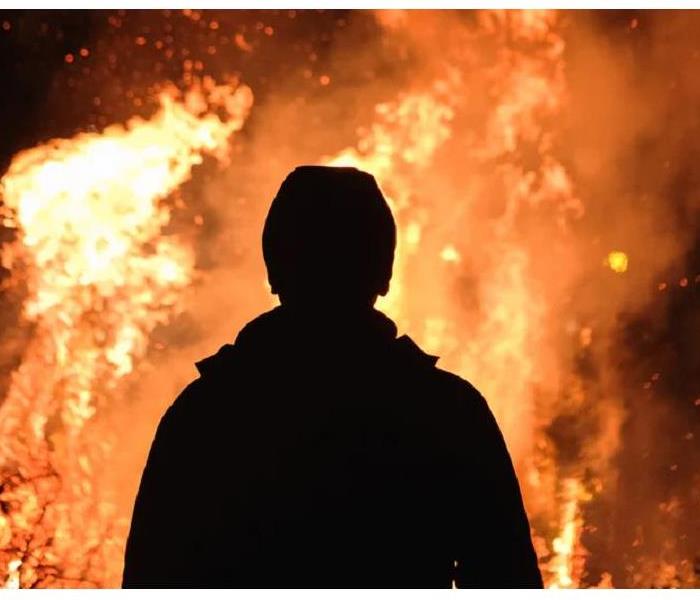 Our staff at SERVPRO of Citrus Heights/Roseville, and Carmichael are fully trained to clean up and restore your home if there is a fire.
Our staff at SERVPRO of Citrus Heights/Roseville, and Carmichael are fully trained to clean up and restore your home if there is a fire.
Disaster can strike without warning. It is preparedness, our great weapon. While you might never need to use any of the resources you prepare, it is better to have them ready.
Wildfire season is fast approaching. Not to mention, July 4 is also around the corner. Although it is already a negotiation to ban or not use firecrackers, looking at how dry and hot it is already, being prepared is a win-win situation.
It is the time of the year that you are at a high risk of a possible wildfire.
Sign Up for Fire Alerts.
Be updated with the latest situation around you. Have several ways to receive alerts.
- Register to get texts from Cal Fire’s plan.readyforwildfire.org, and download their app to receive personal wildfire readiness plans and check current incidents.
- Find updates about local air quality, current weather conditions, and weather forecasts.
- Check National Emergency Alerts, as well as FEMA, as an additional resource for gathering the latest situation in your area.
Review Important Documents.
Make sure your homeowner's and renter's insurance policies, as well as personal documentation such as identification cards, are current. Make duplicates and store them in a password-protected digital vault, an external drive, or the cloud.
Here is a checklist that you may use for your household documents, contacts, and valuables.
Have a Fire Safe Home.
You must ensure that your property complies with California's building and fire standards, which require homeowners to take proactive measures to protect their property from wildfires.
- When constructing, renovating, or repairing a structure, use fire-resistant materials.
- Create a fire-resistant zone or a defensible space at least 30 feet away from your home that is clear of leaves, trash, and flammable materials.
- Make a room that can be sealed off from the outdoors. All doors and windows should be shut when smoky conditions exist, set up a portable air cleaner to keep interior pollution levels low.
- Find an outdoor water supply that you can reach with a hose from anywhere on your property.
Create an Evacuation Plan.
You may have to evacuate quickly due to a wildfire. It is a must to have all the things ready and that each of the household members is well-aware of the evacuation routes.
- Make a "go bag” or an emergency supply kit - a collection of items - that you can take with you. Each family member should have this kit. It is a must that you also keep extra kits in your car in the event you can not get to your home because of a fire.
- Understand your Evacuation Zone. Practice with your household, pets, and identify where you will go. You must also understand the risks of having the Covid-19 if you evacuate to a public shelter.
It is critical to obey local authorities' guidelines. They will provide you the most up-to-date advice depending on the threat to your community and the best safety precautions.
Our staff at SERVPRO of Citrus Heights/Roseville, and Carmichael are fully trained to clean up and restore your home if there is a fire.
Be Wildfire Ready!
6/29/2021 (Permalink)
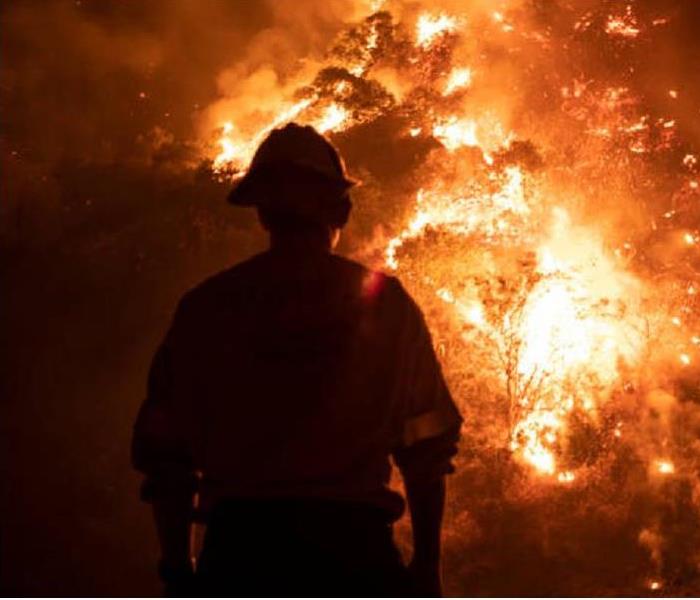 Although it is a lot of work — requires the involvement of every household member — there are real benefits to being prepared.
Although it is a lot of work — requires the involvement of every household member — there are real benefits to being prepared.
It always pays to be ready!
The need to prepare is real. Although it is a lot of work — requires the involvement of every household member — there are real benefits to being prepared.
Here are the three steps to being fire-ready:
1. Map out a wildfire action plan - Although this varies for every household, this requires the participation of each family member.
Here is a checklist to help you prepare a wildfire action plan.
- Determine an emergency meeting location outside of the fire hazard area.
- Plan several different escape routes and rehearse them regularly.
- Have fire extinguishers on hand and let every member of the household know how to use them.
- Ensure that your family members know where your gas, electric, and water main shut-off controls are and how to use them safely.
- Have a radio or scanner so that you can stay updated on fire alerts
- Designate an out-of-area friend or relative as a point of contact so that you can communicate with household members in case of separation.
- Maintain a list of emergency contact numbers. Keep these posted near your phone and in your emergency supply kit.
- Ensure to have evacuation plans for pets, large animals such as horses, and other livestock.
2. Assemble a disaster or emergency supply kit - This contains a collection of necessities your household may need in the event of an emergency. Each family member should have an emergency test kit. It is a must that you also keep extra kits in your car if you can not get to your home because of a fire.
To assemble your emergency supply kit, start by storing items in airtight plastic bags. Put your kit in one or two easy to carry containers. Emergency kits come in many shapes and sizes. Make sure your kit contains the items listed on this checklist.
3. Create a family communication plan - Communication networks and electricity could be unreliable during disasters. Creating a communication plan will help reach each family member and where to meet up in emergencies.
Every member of the household, from toddlers or small kids, seniors, and disabled family members, needs to be considered in creating this plan. It is a must that the methods are well communicated with everyone at a level that they understand. These plans must be well-rehearsed regularly so that everyone will be familiar and guided accordingly.
Remember these three steps: Collect. Share. Practice.
In any case, please know that we're here to help. Our staff at SERVPRO of Citrus Heights, Roseville, and Carmichael, are fully trained to clean up and restore your home if there is a fire.
Most Common Places a House Fire Originates
6/29/2021 (Permalink)
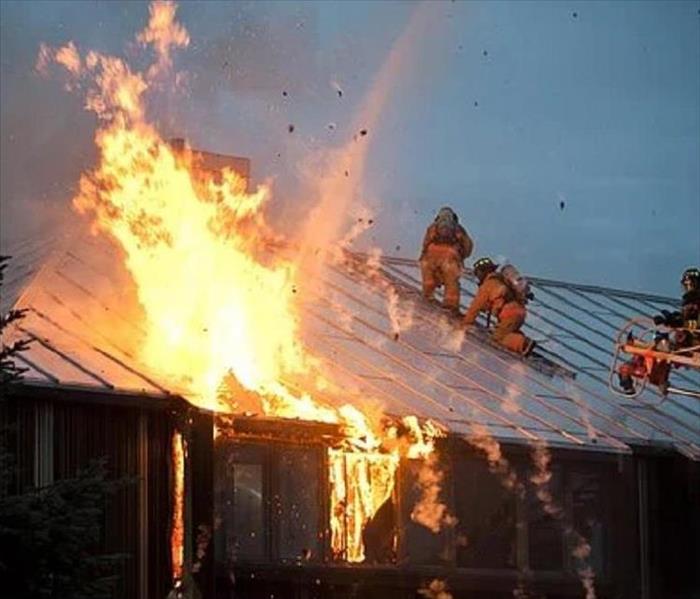 Our staff at SERVPRO of Citrus Heights, Roseville, and Carmichael are fully trained to clean up and restore your home if there is a fire.
Our staff at SERVPRO of Citrus Heights, Roseville, and Carmichael are fully trained to clean up and restore your home if there is a fire.
There is nothing more important than a good, safe, secure home. Everyone will agree with this famous saying. So it is a must that we take all steps to ensure that our home is the safest place. Sadly, though, incidents can happen in the comfort of our own homes.
According to the United States Fire Administration, residential buildings are the leading property type for fire deaths, injuries, and property losses. To prevent this from happening, it is best to understand the most common places where spark starts and turns it into a savage fire if neglected.
1.The Kitchen
Cooking is the leading and most common type of fire comprising 49 percent of all residential fires, according to NFPA. Never leave the kitchen unattended when cooking. We also have to keep an eye when frying, or any time when large quantities of grease are involved. Turn off the stove and all appliances once done. Cooking appliances should also be cleaned thoroughly and cooled down properly before storing them away.
2.The Bedroom
Surprisingly, the bedroom is the second most common place where the fire originates in the home. Old mattresses or beddings, carpets, draperies, and other plush objects are often the first items that ignite and catch on fire quickly. It is advisable to buy new mattresses made after 2007 as they are flame-retardant and hold to a higher safety standard as they conform to Federal Mattress Flammability Standard. Place space heaters at least three feet from anything that could catch fire. And do not forget to turn them alongside other heating equipment like heating blankets and pads.
3.The Chimney
If equipment needs preventive maintenance, Chimneys must be serviced and cleaned regularly as well. Since this area is neglected, many fires happen in the chimney and surrounding the fireplace. Keeping your chimney cleaned and serviced can help prevent a fire in your house.
4.The Living Room
Fireplaces, electronics, couches, rugs, and drapes are flammable and can cause a fire. And with all the electrical equipment available in the living room, make sure that circuits aren’t overloaded. Also, don’t leave your lights on overnight (especially halogen lights and other high-risk materials).
5.The Laundry Room
Dryer lint is the main culprit for laundry room fires. Clean vents and filters regularly. It is important to note that the heat from the dryer can easily cause dryer lint and catch fire. Don’t overload the washer or dryer and leave room for laundry to tumble. Machine instruction’s manual should be followed.
6.Outside the Home
Having fires outside could catch into your home. Maintain at least a reasonable distance from home when grilling your food outside or having a bonfire. Like cooking, do not leave these activities unattended. Ensure fires are completely put off before heading back inside your home.
7.The Attic
This area of the home is often neglected because of its inaccessibility. It’s important to make a mental note or create a schedule to have it checked by a professional, licensed electrician and address issues. Ensure your home is to code when it comes to insulation and electric standards. Dangerous wiring can cause a fire.
It's always a good idea to have your house checked by professionals, especially if your abode is a bit old. Never perform your own repairs or improvements to save money.
If there is a fire in the home, you will need to hire a professional fire mitigation and restoration company. Our staff at SERVPRO of Citrus Heights, Roseville, and Carmichael are fully trained to clean up and restore your home if there is a fire.
Addressing Water Damage After a Fire
7/6/2020 (Permalink)
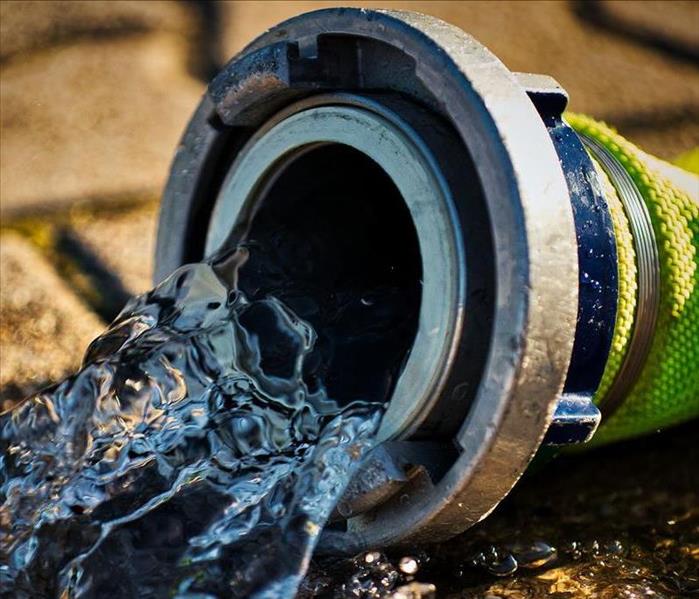 The main weapon firefighters deploy a fire with is their water hose, the pressure and force alone can douse a fire and property materials can ruin.
The main weapon firefighters deploy a fire with is their water hose, the pressure and force alone can douse a fire and property materials can ruin.
Friend or Foe? Is water a collaborator in fighting a fire or an accomplice to the damage sustained? Water, if not correctly used, it can be a double-edged sword in a fire hazard. It might initially sound counter-intuitive to consider water damage after a fire hazard. Still, water is involved in every stage of a fire hazard.
At the beginning of a fire
If you have fire sprinklers, these are activated by smoke or heat. Some sprinkler systems are activated only in specific rooms where the fire is detected, while others are an all-or-nothing system. As the whole room or area gets sprinkled with water, materials also get sprayed.
During the fire
If the fire spreads and gets hotter, utility pipes get damaged. Fire quickly melts and damages PVC water pipes, and leakages occur. If the water pipes are copper, the fire heats the water and builds up pressure in the pipes. Cracks and joints can burst open, flooding the immediate area.
Fighting the fire
The main weapon firefighters deploy a fire with is their water hose. The pressure, force, and sheer amount of water brought to bear on a building is often enough to douse a fire, break properties, and drench everything. It is a common sight for furniture and household items to be soggy in the aftermath of a fire due to this step.
After the fire
At this phase, it is essential to quickly address the damage from the previous stages, as water damage can have a lasting effect. When water damage is left unaddressed, the damage compounds over time. The moist environment and soaked materials are perfect conditions for mold to grow.
Carpets get damaged, drywall, and the ceiling soaks up water, compromising their structural integrity and aesthetic appeal. Unaddressed, water damage from a fire constitutes a danger. The seal around appliances such as sockets and bathtubs weaken and break lose, opening up an opportunity for infestation by moisture-loving pests such as pill bugs. Electrical shock is another risk unaddressed water damage can pose.
It is imperative to contact a restoration expert as delay often leads to further damage and rising costs. Their understanding and help would also help get your home/office back to normal as soon as possible. Contact SERVPRO of Citrus Heights/Roseville and Carmichael to address your fire and water damage concerns.
4th of July Safety Tips
6/29/2020 (Permalink)
 SERVPRO of Citrus Heights/Roseville and Carmichael wishes you a safe and happy Independence Day!
SERVPRO of Citrus Heights/Roseville and Carmichael wishes you a safe and happy Independence Day!
The 4th of July is undoubtedly a day of festivity across the country. Irrespective of your state, two activities are synonymous with Independence Day celebrations. Fireworks and Cookouts. Lighthearted and fun, these two activities are filled with hidden dangers.
Fireworks
The National Fire Prevention Agency (N.F.P.A.) and the U.S. Hospital Emergency Rooms report thousands of fires, burns, injuries, and even a few deaths associated with fireworks. A cool wind, the heat, dry combustible materials, and flying sparks can combine to start a fire quicker than a blink of an eye. And being in a festive mood, it is easy to dismiss the glow of a burning material as another firework is going off. Considering that children and teens are often the victims, it is a sign of responsibility to be aware of the dangers.
Fireworks are not the only issue in fires breaking out on holiday. Celebrating the 4th with an outdoor cookout is a long American tradition. Considering that 7 out of 10 U.S. adult possess either a grill or a smoker, it is easy to be lax about safety as it is an activity one is familiar with.
Safety Tips
The tips below are not exhaustive. They serve as a starter pack for you to keep both yourself and your family safe during this celebration.
- Check the Fire Danger Index for your local area.
- Be careful if a drought has been recorded in your area.
- Keep a water hose or a bucket nearby
- Have a fire extinguisher handy. Remember P.A.S.S. – Pull, Aim, Squeeze, Sweep – when operating it.
- Be aware that grease and fat buildup on grill grates are prime fuel for fires.
- Don't grill under overhangs, including railings or trees.
- Keep children, pets, and materials at least 3 feet away from grills. 17% of grill fires often involved items being dangerously close to the grill.
- Never leave the grill unattended.
These tips should help to keep your family safe. SERVPRO of Citrus Heights/Roseville and Carmichael wishes you a safe and happy Independence Day!
Plan Before Fire Strikes
6/27/2020 (Permalink)
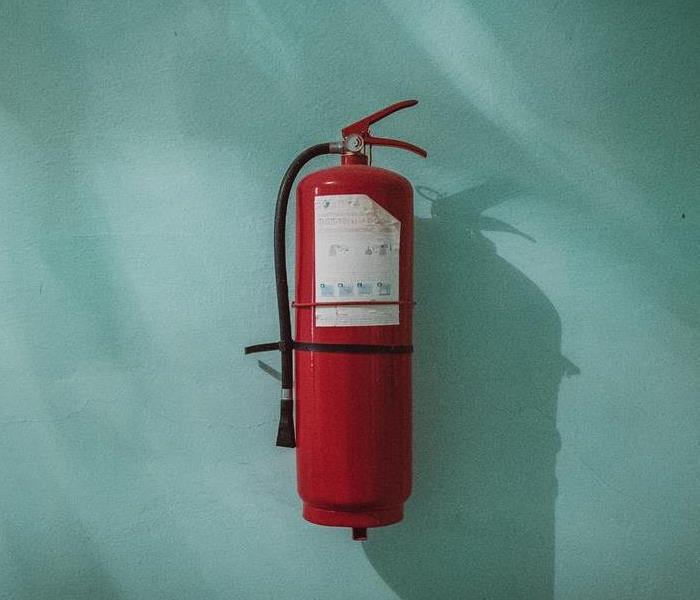 Learn to use and maintain a fire extinguisher. Contact a certified authority such as the fire department.
Learn to use and maintain a fire extinguisher. Contact a certified authority such as the fire department.
Fire can happen to anyone. The threat is universal and sometimes with the littlest provocations. However, as a Malay Proverb says, “Prepare the umbrella before it rains.” It is essential to follow proper guidelines in preparation for the eventuality of a fire.
Three Ways to Plan Before Fire Strikes
ESCAPE PLAN
A clear and well-understood fire escape plan is critical. Having a plan eliminates confusion and decision paralysis that might occur in the heat of an emergency. A few essential components of such a plan include:
- Make sure windows are easy to open up from the inside.
- Know your way around instinctively. Practice feeling around the house in a blindfold or the dark.
- Ensure children understand to cooperate with firefighters and know where to go should a fire arise.
FIRE DETECTOR
The earlier you know there’s a fire, the better your chances of surviving.
Guidelines include:
- Install smoke alarms. Every area of the house should have a fire alarm.
- Have a schedule to check and replace the batteries in all alarms
- Have a plan to test and replace the alarm units.
- Never disable a smoke alarm (not even when cooking).
- Have smoke alarm options for people with accessibility needs. The alarm should also trigger sounds, strobe/flashing lights.
BE PROACTIVE
These are extra steps to minimize potential losses and ensure all preparation does not go to waste.
- Create digital copies of relevant documents. Backup these copies to a secure cloud-based service (such as Google Drive, Dropbox, etc.).
- Learn to use and maintain a fire extinguisher. Contact a certified authority such as the fire department.
- Consider an automatic fire sprinkler.
- Ensure your home is not a fire hazard. Keep your home in top safety conditions.
Proper preparation is vital in determining how disastrous a fire hazard would be to you.
What to do If Fire Strikes
6/23/2020 (Permalink)
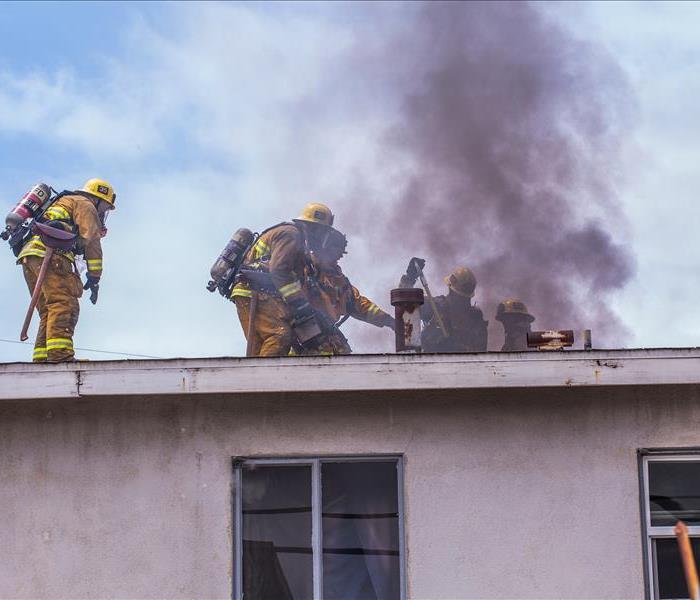 Fire grows rapidly and it is hot and deadly. There are certain things you can do to be safer and to minimize damage.
Fire grows rapidly and it is hot and deadly. There are certain things you can do to be safer and to minimize damage.
During a fire, adhering to guidelines could be the difference between surviving a fire with only a bad scare or having a true crisis on your hands. There are so many things to consider once a home fire begins. Fire grows rapidly and it is hot and deadly. There are certain things you can do to be safer and to minimize damage.
Consider the following:
Fire is Fast
It can take as little as 30 seconds for a small flame to turn into a major fire. Be decisive in your actions. Take a direct, unhindered route to the nearest exit. If the primary exit is blocked, make use of the alternative exit.
Fire is Hot and Deadly
Fire generates a lot of heat. Fire produces smoke and other toxic fumes. Asphyxiation and disorientation are real dangers.
- This hot air can cause a lot of damage to the lungs if inhaled. Crawl to the exit to avoid the heat, as well as smoke and toxic gases that collect closer to the ceiling.
- Cover the nose with a wet piece of cloth to prevent inhaling toxic fumes.
- The heat can also cause damage to the skin as well. If you cannot get out fast enough, dampen your cloth.
- Before grasping a door handle/ knob, briefly touch it to test how hot it is. Be ready to shut the door quickly if heavy smoke or fire is present.
- If your clothes catch fire - stop, drop, and roll. Stop right away and drop to the ground covering your face with your hands. Once You do so, roll over and over or back and forth until the fire is out.
Other Guidelines
If all means of exiting are inaccessible; close the door, cover vents and cracks around the outside of your doors with cloth or tape to keep smoke out. Call the fire department and describe where you are.
- At the sound of available help, signal for help at a window with a light-colored cloth or a flashlight.
- If you can't get to someone or a pet needing assistance, leave the home and call the fire department.
- Make necessary adjustments to facilitate emergency escape for adults and people with accessibility needs.
Tips to Prevent Home Fires in Citrus Heights/Roseville and Carmichael
6/19/2020 (Permalink)
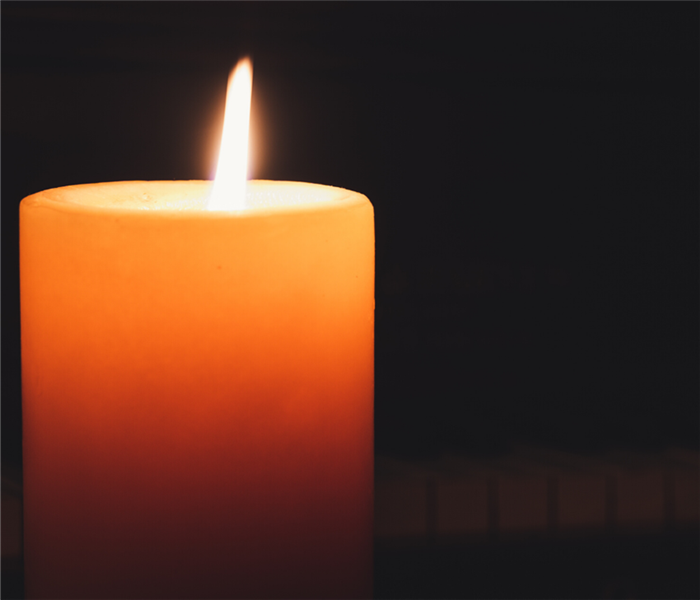 Tips to Prevent Home Fires in Citrus Heights/Roseville and Carmichael
Tips to Prevent Home Fires in Citrus Heights/Roseville and Carmichael
Avoiding a fire outbreak in the home comes down to become more safety-conscious and following specific fire safety guidelines in the home. Following these guidelines will help to prevent a fire incident in the home.
General Guidelines
- Children
- Matches and lighters should be out of sight, reach, and access for kids.
- An adult should always be with kids whenever there is an operating stove or burning candles.
- Teach kids to be responsible with fire as a tool, not a plaything.
- Fire Hazard Awareness
- Keeping combustible and flammable liquids/ materials close to heat sources is a recipe for disaster.
- Ovens and stove ranges are not meant for heating the home.
- Portable generators should be used and refueled outdoors and/or in well-ventilated areas.
Activity Specific Guidelines
- Cooking
- Stay in the kitchen when cooking. If you are leaving, even for a short period, turn off the stove.
- Wear short, close-fitting or tightly rolled top sleeves when cooking.
- Enforce a 3-feet "kid-free zone" around the stove.
- Grills should be at 10 feet away or more from any siding and deck railings, and out from under eaves and overhanging branches.
- Smoking
- Don't smoke in bed, especially when drowsy, or when tipsy, or when Oxygen is being used in the home.
- Smoke outside, completely stub-out butts in an ashtray or a can filled with sand. Also, soak cigarette butts and ashes in water before throwing them away. Hot cigarette butts can light up a trash can.
Equipment Guides
- Electrical and Appliance Safety
- Don’t force plugs to fit into a slot outlet or extension cord that is not an exact match.
- Immediately turn off, unplug and professionally replace faulty appliances, light switches that are hot to the touch, or frayed wires.
- Portable Space Heaters
- Purchase heaters evaluated by a nationally recognized laboratory.
- Thermostat control and automatic switch-off mechanism are important features in a portable heater in preventing fires.
- Use the heaters in a well-ventilated room.
Fireplaces and Wood stoves.
- Schedule regular and thorough inspection of wood stove pipes and chimneys.
- Use a fireplace screen that is heavy enough to stop any rolling logs and that are big enough to cover the entire opening of the fireplace to catch any flying sparks.
- If the fire is not completely out, do not leave the house or go to bed.
Following these fire safety guidelines should help you prevent a fire in your home in most cases.
Staying Safe When a Wildfire Is Near
6/15/2020 (Permalink)
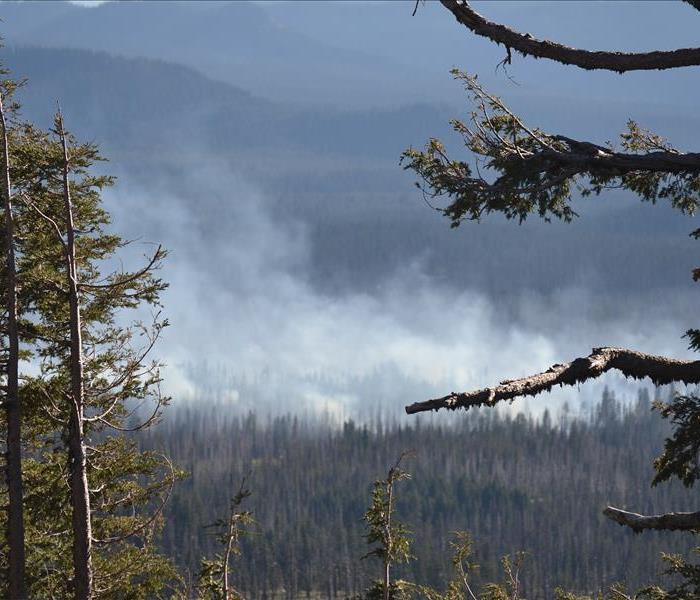 A wildfire is a fire that is unplanned and that burns in a natural area such as a forest, grassland, or prairie.
A wildfire is a fire that is unplanned and that burns in a natural area such as a forest, grassland, or prairie.
A wildfire is a fire that is unplanned and that burns in a natural area such as a forest, grassland, or prairie. Fire in these types of unclosed space can often get out of hand and become disastrous. Even while it is under control, the smoke and fumes can pose a severe threat.
When such is the scenario, few guidelines would be of immense help.
- Evacuate immediately if authorities tell you to do so.
- Call 911 if you are trapped and give your location. Understand that emergency response may be delayed or impossible.
- Listen to local alert systems for emergency information and instructions for your area.
- Use N95 masks if available to keep from breathing harmful particles.
- If you are not ordered to evacuate, but conditions worsen, stay inside in a safe location.
However, safety should start before a wildfire occurs.
- Sign up for emergency alerts broadcasted by the authorities such as Emergency Alert System (EAS) and National Oceanic and Atmospheric Administration (NOAA) Weather Radio.
- Get familiar with the evacuation routes and shelter locations in your community.
- Have emergency supplies such as N95 respirator masks. Emergency supplies should take into consideration specific needs – physical, medical, and age-related needs.
- Select a room. Use a portable air cleaner to keep pollution levels down. Ensure the room can be sealed off – doors, windows, and door cracks. It is also helpful to keep home surroundings free of leaves, debris, or flammable materials.
- Keep essential documents in a fireproof, safe place. Have a password-protected digital backup as well.
After the fire, follow these steps:
- Return home if authorities say it is safe to do so. The same goes for drinking water.
- Stay alert to hot embers, flooding due to the changing landscape and other information issued by authorities.
- Use fire-resistant materials to rebuild, renovate, or make repairs. A professional restoration company like SERVPRO of Citrus Heights/Roseville and Carmichael can help.
Protecting Your Home From Fire Damage this Summer
6/10/2020 (Permalink)
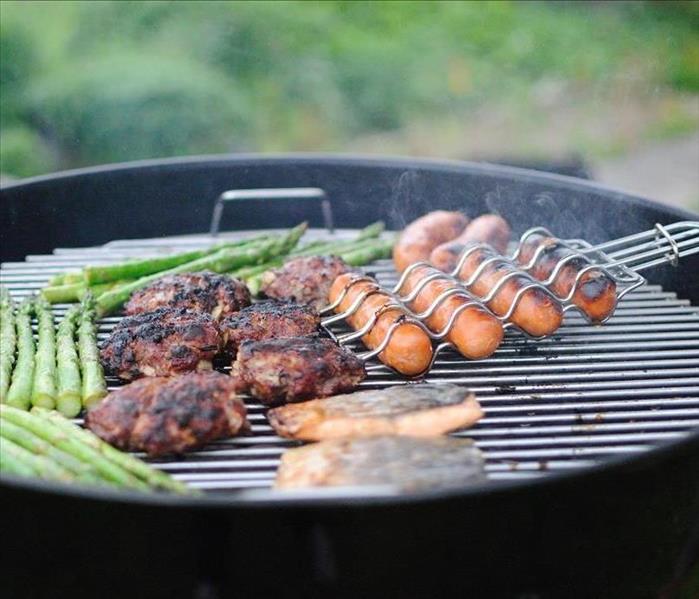 It is advisable to keep barbecues away from the house structure, dry trees, or fabric materials.
It is advisable to keep barbecues away from the house structure, dry trees, or fabric materials.
Summertime indeed is a great time to spend with family and friends, especially the time for a small gathering outside your garden, camping, bonfires, and fireworks. While this is an exciting time for getting together, the high temperature of summertime can quickly spark a fire in the home. To protect your home from fires, follow the steps below.
Watch Your Grill
Grills can easily cause a fire when close to flammable material. It is advisable to keep barbecues away from the house structure, dry trees, or fabric materials. When using a grill, make sure it is in a well-ventilated area. Always keep the grill clean to prevent a grease fire. Gas grill cause about 80% of grill fires. Check the gas holes and connectors. Approximately 12% of grill fires is caused by charcoal fueled grills. Ensure charcoals are completely cooled before disposing to avoid fire outbreak.
Light Fireworks Far From Home
Hundreds of home properties are damaged by fireworks yearly. Ensure you light fireworks in an entirely safe location away from families, homes, grasses, and sheds.
Beware of Lawnmower Fires
If your mower is damaged, especially if the damage is from the fuel line, do not use it, get it repaired. If the grass is dry, any spark from the mower can cause grass fire to spread rapidly and may go out of hand. Check the carburetor for leakage or damage and replace your fuel line yearly.
Practice Fire Safety While Smoking
Avoid smoking in the bedroom or close to materials that can catch fire easily, such as clothes and wooden tables. Ensure cigarettes are completely out and dispose of properly.
Check A/C and Dryer Vents
Inspect your AC system yearly and clean dryer vents regularly. Dust and tilt can pile up in your AC system and dryer vent which, if not cleared for proper ventilation, may cause a fire.
Check Your Smoke Detectors Regularly
Smoke detectors are essential in every home. The alarm makes you aware that early smoke is detected in installed places before it escalates to a severe fire. Test smoke detectors sometimes to determine its working condition. Inspect and service smoke detectors regularly.
If you require a service expert to after fire damage, don't hesitate to call SERVPRO of Citrus Heights/Roseville and Carmichael at (916) 966-2601.
5 Ways to Reduce Industrial Fires
6/1/2020 (Permalink)
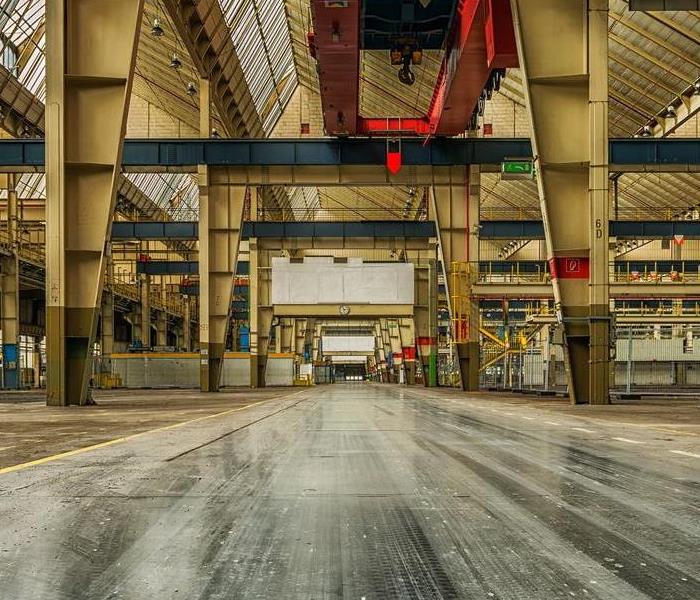 To avoid falling victim to industrial fire, there are several things you can do to prevent an industrial fire outbreak.
To avoid falling victim to industrial fire, there are several things you can do to prevent an industrial fire outbreak.
Industries lose millions of dollars to fire yearly. Between 2012 and 2015 alone, about 37,910 industrial properties were gutted by fire, according to the National Fire Protection Agency (NFPA).
To avoid falling victim to industrial fire, there are several things you can do to prevent an industrial fire outbreak.
First, identify the most common causes of industrial fires. These are
- Combustible Dust Fire
- Hot Work Fire
- Flammable Liquid and Gas Fire
- Equipment and Machinery Fire
- Electrical Hazard Fire
1. Combustible Dust Fires
When dust or fine material is mixed with air in a particular concentration, it explodes. The severity of a combustible dust explosion can bring down an entire facility.
To prevent a combustible fire, carryout dust inspection, housekeeping, testing, and control program on your facility.
Be on the lookout for dust residues in open and hidden areas. In the presence of an ignition system, avoid cleaning methods that generate dust clouds. Open flames should be controlled.
2. Hot Work Fires
Any work that requires high heat or generates flames is regarded as hot work. Examples of hot work are soldering, welding, heat treatment, grinding, and more.
Hot works can be prevented by:
Training personnel and ensuring they adhere strictly to safety measures.
Remove flammable materials from operation areas.
Ensure a safety professional is on-site to supervise operations.
3. Flammable Liquid and Gas Fires
Flammable liquids and gases should be handled with utmost caution to prevent an explosion.
Flammable liquid and gas fire can be reduced by keeping them far away from heat or ignition sources. Store hazardous materials, according to OSHA. Provide safety protective equipment, like bodysuits, goggles, shoes, etc.
4. Equipment and Machinery Fires
Equipment and machinery fires are common amongst equipment poorly operated, installed, or maintained, or operated. Hot work and heating equipment are mostly causes of equipment and machinery fires, if not properly maintained.
As mentioned earlier, heavy-duty hot work equipment requires immense training on equipment operation, as well as the need to focus on handling and maintenance of equipment.
The surrounding environment should be kept clean at all times. Sometimes, overusing a machine can make it react badly and may lead to fire hazards. Prevent machines from overheating.
5. Electrical Hazard Fires
A spark from an overloaded circuit, poor wiring, or defective material can raze a whole facility near combustible dust, flammable liquids, and gases.
Therefore, avoid overloading electrical circuits. Turn off a machine or equipment when not in use. OSHA and NFPA recommend the use of antistatic material.
Inspect your facility for combustible dust and other hazardous materials and clear equipment area of such.
Take on fire safety measures in your facility. Engage your employees with fire safety training to educate them on proper fire safety equipment operation and safety procedures.
Protect Yourself From These Five Fire Danger Causes
5/30/2020 (Permalink)
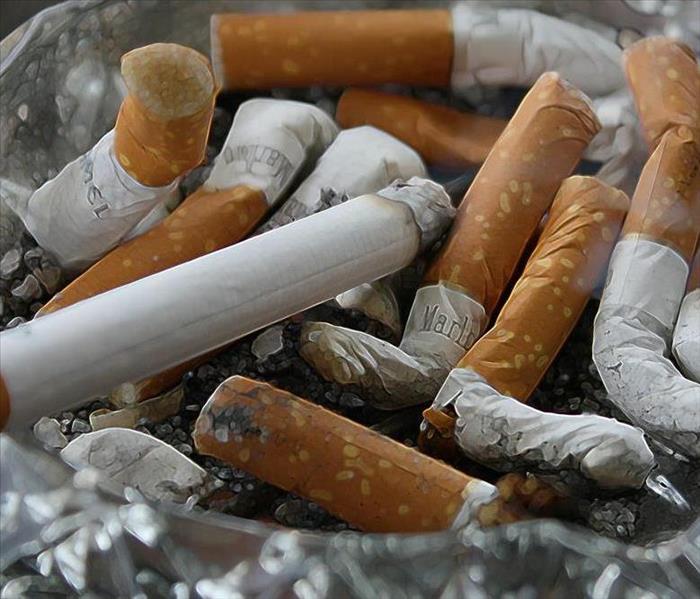 19% of home fire deaths are caused by smoking.
19% of home fire deaths are caused by smoking.
It is essential to stay safe and protect our loved ones as well as our property and belongings. Nonetheless, there are basic things we do in the home that, if not properly managed, can get out of hand and endanger our loved one's lives and our properties. No one wishes to fall victim to a fire outbreak. Moreover, what many don't know is that heat and smoke can be more dangerous than fire. Statistics show that the number of people that die of suffocation is triple to fire burns. It should be noted that inhaling toxic fumes and gases can lead to dizziness and confusion and deter one from escaping an emergency.
To live freely in your home with your family, you have to protect yourself from these five danger causes:
Cooking
Cooking causes fire; therefore, never leave food on fire unattended to. Stay put in the kitchen when cooking. A high percentage of a home fire is caused by cooking.
Remember to turn off the burner before leaving the kitchen. Keep flammable materials like curtains, towels, wooden utensils, and others away from the stove. If you have to leave the room, turn off the burner. Keep a fire extinguisher in the kitchen should there be an emergency.
Smoking
19 percent of home fire deaths are caused by smoking. There are places we should avoid smoking in the home. In short, avoid smoking inside the house. If you want to smoke, take it to the corridor, sit out, put out the smoke, and dump it properly. Smoking is hazardous in the bedroom because when the smoke comes in contact with the bedsheet or curtains, it can quickly go in flames. Avoid smoking in the bedroom, living room, and den.
To be on the safe side, if you cannot take smoking outside, use deep and wide ashtrays and keep away from wooden tables or upholsters. Never smoke on the bed, you may fall asleep, and it may end badly.
Heating Equipment
Improper use of heating equipment can be dangerous in the home. Heaters should be kept at least three feet away from anything flammable (bedding, curtains, mattresses, clothing, and upholstery). Keep children away from space heaters and open fires. Turn off portable heaters before you leave the room or go to sleep. Get your chimney cleaned annually by professionals.
Electrical Problems
Faulty wiring, outdated appliances, and malfunctioning lighting equipment can cause electrical fires if not looked into quickly. Never manage or do any electrical work yourself; it's far too dangerous. Electric sparks are frequent among improper connections and can cause a fire. Avoid overloading outlets, especially with heat-producing appliances like microwaves, space heaters, and toasters. Call an electrician immediately when you detect a potential electrical problem.
Candles
Avoid using candles, if you would use one, keep away from anything flammable. Blow out candles before leaving the room or go to sleep. Never use a candle in the kid's room.
No one wishes for a home fire, but then it could be ignited easily and quickly. Keep safe habits so your family will be protected and remain safe.
Protect Your Family From Home Fires and Be Prepared
5/26/2020 (Permalink)
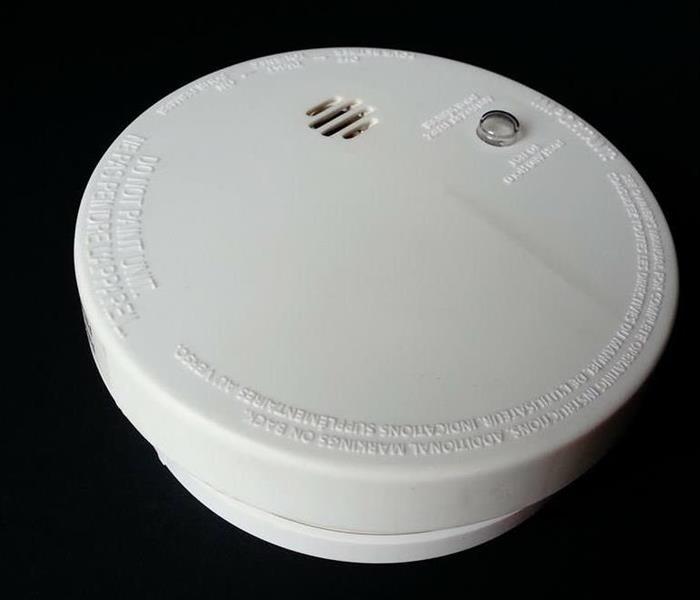 Install a smoke alarm system in every part of your home to notify residents of smoke quickly before it escalates.
Install a smoke alarm system in every part of your home to notify residents of smoke quickly before it escalates.
Do you know that three out of five fire deaths occur in homes without a working smoke or fire alarm system? Surprisingly, carbon monoxide (CO) is the highest recorded cause of accidental poisoning in the U.S., according to the National Fire Protection Association (NFPA). Safety is paramount in every home. That is why you must be prepared to take on necessary preventive measures to protect the lives of every member of your family and properties.
The following tips guide you on protecting your family from a home fire and being prepared:
- Install a smoke alarm system in every part of your home to notify residents of smoke quickly before it escalates. Educate your family on the significance of the fire alarm sound and what to do when it goes off.
- Frequently test your alarm systems to know if they are functional. Maintain CO/fire/smoke alarm systems regularly and replace faulty ones. For a battery-powered alarm system, change the batteries every six months. For a hardwired alarm system, get a backup battery during a power outage. Alarms are to be replaced every ten years.
- Double-up on safety with a carbon monoxide alarm. About 450 people die of carbon monoxide yearly. carbon monoxide is an odorless gas and is impossible to detect without an alarm system. You could get a 2-in-1 alarm for smoke and carbon monoxide.
Home Safety Tips
- Avoid unattended cooking. According to the NFPA, the top cause of the home fire is unattended cooking. It is advisable to do nothing else when cooking. Don’t have divided attention when cooking. On a serious note, stay put in the kitchen when cooking.
- Place fire extinguishers in strategic places. The kitchen, passages, laundry room should be equipped with fire extinguishers.
- Create an escape plan for every member of your family, especially children. Practice the emergency escape plan until you are convinced everyone is familiar with it. It is important to identify two exits, that is, the door and the window, and decide on a meeting spot outside the house. Once everyone is safe, be sure to call 911. Emergency escape plans should be practiced at least twice a year.
These tips should be quite useful to you and the other members of your household. If a fire event does break out contact our team of professionals to help you get your home back in order, "Like it never even happened." Reach our team at (916) 966-2601.
Safety Tips to Prevent a Dryer Fire
4/23/2020 (Permalink)
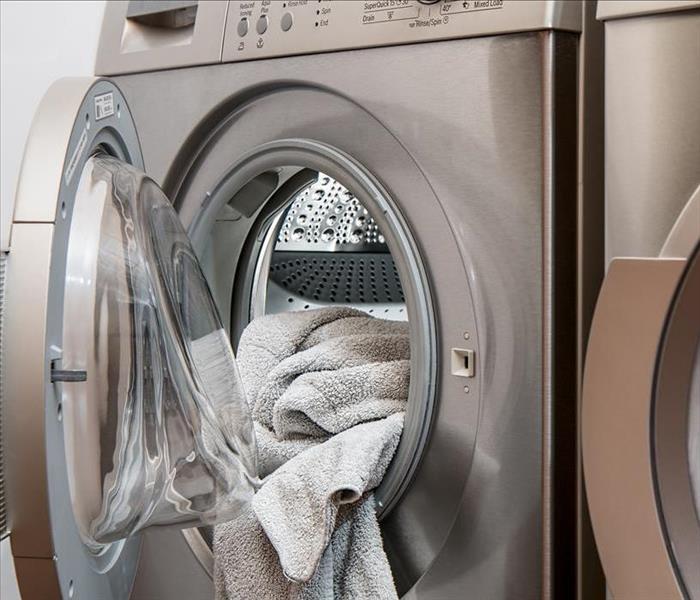 To avoid fire hazards caused by dryers and for the safety of families and homes, it is important to keep dryers in proper working condition
To avoid fire hazards caused by dryers and for the safety of families and homes, it is important to keep dryers in proper working condition
Dryers are essential and effective household machines. However, to avoid fire hazards caused by dryers and for the safety of families and homes, it is important to keep dryers in proper working condition. Below are things to do to avoid a dryer fire.
Hire a professional technician to ensure the proper and careful installation of your dryer. There are different kinds of dryer units – gas dryers, electric dryers, and washer/dryer combos. Professional technicians are familiar with the different kinds of dryers and various installation techniques of the vent pipe.
Having a professional install and service your dryer unit for you can help ensure that any potential hazard is handled properly.
According to a source, "Experts suggest that the primary cause of clothes dryer fires is the failure to clean and maintain them." It is advised that dryers are serviced annually which involves cleaning, inspecting of the hose, and vent for any blockages. Inspect gas lines as well.
- Keep the Surrounding Area Free of Flammables
Do not keep boxes, clothes, and cleaning products around the dryer because they may cause a fire outbreak which could spread quickly. Clean the dryer and flammable material should be disposed of properly.
- Clean the Lint Filter Before and After Each Load of Laundry
Household dust and lint are the most common sources of ignition in dryer fires. Before and after every laundry, ensure you clean the lint filter and screen.
- Use Only Rigid or Flexible Metal Venting Material
Flexible or rigid metal venting materials are great for sustaining proper drying time and airflow. However, accordion-type duct work can increase blockage by trapping lint and creating clogs. If you use plastic or coiled wire foil dryer venting consider replacing it with rigid non-ribbed metal ducts.
- Ensure Air Exhaust Vent Pipe is Unrestricted
One of the causes of a dryer fire is blocked dryer vents. Some people are completely unaware that the vents require regular cleaning. When blocked, the vent restricts airflow, which may cause overheating and fire. Endeavor to clean exhaust vents regularly.
When a dryer is overloaded, this can cause its mechanism like a drum belt, spindle bearings, and pulleys to work overtime, producing higher than average temperatures. As a result of this, the friction can ignite a spark and cause a fire.
- Never Run the Dryer When You Leave Home or Are Sleeping
Consider running the dryer only when you are home and awake. Keep a fire extinguisher in your laundry room in case of an emergency.
Fire Damage and Your Contents
4/20/2020 (Permalink)
 SERVPRO® of Citrus Heights/Roseville and Carmichael's trained professionals will clean, repair tears, and restore paint loss to your paintings.
SERVPRO® of Citrus Heights/Roseville and Carmichael's trained professionals will clean, repair tears, and restore paint loss to your paintings.
Fire damage happens when you least expect it. It is a saddening experience, leaving ashes and wreckage everywhere. When fire havoc occurs, it causes physical, financial, and emotional challenges. Content restoration specialists like SERVPRO® of Citrus Heights/Roseville and Carmichael help with the process and address your needs, saving any items affected by the fire damage so you can feel more relaxed and at ease when the cleaning process is complete.
You may not be able to fix the wreckage by yourself that is why SERVPRO® of Citrus Heights/Roseville and Carmichael is always at your side. At any time of the day, we are happy to fix fire damage at your residence or office "Like it never even happened."® SERVPRO® of Citrus Heights/Roseville and Carmichael salvage electronic devices, artwork dishes, appliances, carpets antiques, furniture, bedding, clothes, jewelry, and more.
What To Expect From The Technicians
We use unique cleaning and sanitation techniques to salvage items damaged by fire. Below are the procedures used for savaging different equipment.
- Carpets, Rugs, and Upholstery
Commercial grade vacuums are used to separate ash from the fibers. After separation, all soot marks are removed with a natural cleaning solution.
- Kitchen Hardware and Appliances
High-tech equipment is used to wash and polish pots, pans, mixers, and other kitchen hardware to restore their original look.
Our trained professionals will clean, repair tears, and restore paint loss to your paintings.
We use computer-controlled wash systems to restore your computers, stereos, or game consoles. Innovative technology is adopted to remove harmful particles from your electronics. These machines are guaranteed to remove about 99 percent of contamination —more than the human hand could do!
SERVPRO® of Citrus Heights/Roseville and Carmichael are your tested and trusted local professional fire damage repair and restoration specialists. Feel free to Call (916) 966-2601 and you will not be disappointed.
Prepare For a Home Fire
4/19/2020 (Permalink)
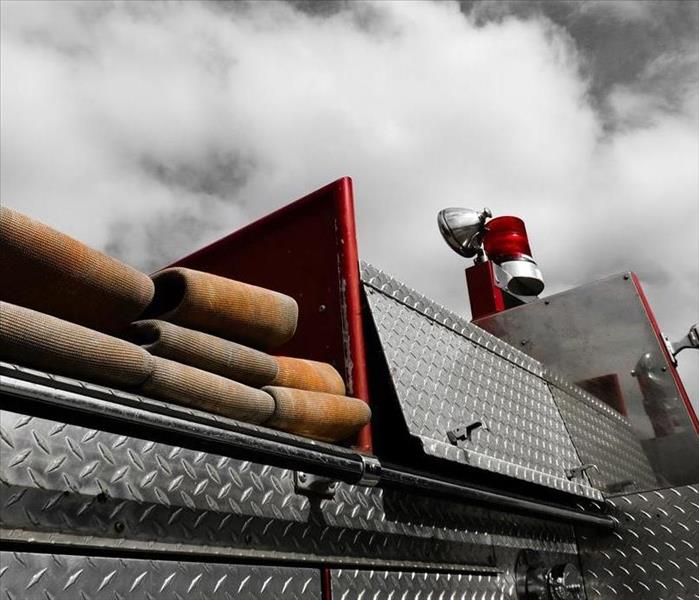 If your property gets damaged by fire, remember to contact SERVPRO of Citrus Heights/Roseville and Carmichael.
If your property gets damaged by fire, remember to contact SERVPRO of Citrus Heights/Roseville and Carmichael.
Fire outbreak can make you lose all or some of your properties, you must prepare for a fire outbreak beforehand by taking preventive measures. SERVPRO of Citrus Heights/Roseville and Carmichael is a professional mitigation and restoration company that helps people plan ahead of time for fire and helps those cleanup after a fire. Fire can be caused by electric appliances or flammable objects. Moreover, below are things you need to know to prepare for a home fire.
Smoke alarms are very helpful before a fire outbreak. The system detects smoke and sets the alarm to notify you of an impending fire outbreak. It is good to install multiple smoke alarms in your home, especially in the kitchen and rooms. Ensure to check for maintenance twice a year.
- Plan and Practice Multiple Escape Routes
Multiple escape routes should be considered when building a house or buying a home. If you did not make a plan for this, you should so that you can avoid being trapped during a fire outbreak. Every member of the family should be let in on the escape routes for cases of emergencies. Practice escape routes with family members at least twice a year.
It is important that every member of the family knows the smoke alarm and how to determine the source if it is a minor smoke that can be easily engaged to avoid the smoke from escalating into a fire. It's key that every member, especially children, in your home knows exactly what to do in the event of a fire. Educate family members on what smoke alarms sound like and what to do once they hear it sound off.
- Establish a Family Emergency Communications Plan
In case of a fire outbreak, each member of the family should know who to contact, especially if he or she gets separated. Draft out an escape plan for the family. Put an ICE (in case of emergency) number in your children’s phone and tell them the importance of dialing it for help in case of emergency.
- Ensure Everyone Knows 9-1-1
Every member of the family must know the emergency number (9-1-1) to dial in case of an emergency.
- Stay Safe During a Fire Outbreak
In case of a fire outbreak, get out and stay out, if the fire cannot be contained. Make sure everyone else is out as quickly as possible and try not to panic. Grab your emergency go bag if you can, close the door of the room where the fire is and close all doors behind you as you leave if possible. If you cannot get out through the door get to a window and open for air. If it's not the ground floor, remain by the window and wait for rescue.
We hope you don't fall victim to a fire outbreak but if your property gets damaged by fire, remember to contact SERVPRO of Citrus Heights/Roseville and Carmichael by phone on (916) 966-2601. We'll make it "Like it never even happened."
Information About Smoke and Soot
4/6/2020 (Permalink)
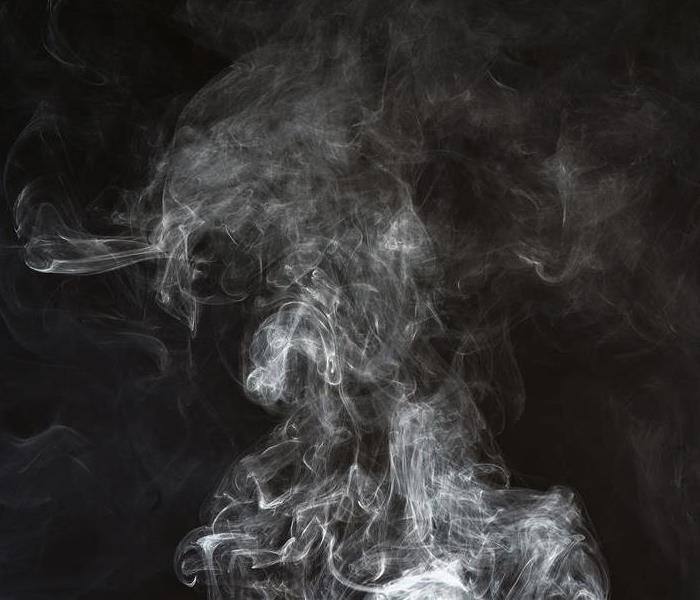 SERVPRO of Citrus Heights/Roseville and Carmichael tests soot residue to determine which type of smoke they’re dealing with.
SERVPRO of Citrus Heights/Roseville and Carmichael tests soot residue to determine which type of smoke they’re dealing with.
Smoke and soot are capable of causing unnoticeable damage to your home.
They both seep and spread into the hidden spaces within your home’s structure. They also cause an odor that’s similar to the smell of asphalt.
Our experience and knowledge of smoke damage allow us to properly inspect your home, determine the degree of the damage, and develop an effective solution.
What you need to know about smoke and soot:
- The gaps in the structure of a building that allows pipes to reach multiple floors provide a penetrable pathway for smoke to travel along.
- When smoke is hot it not only rises to the uppermost areas of a structure but also travels to the cooler areas.
- There are various types of smoke and the restoration process varies depending on what type is present.
Types of smoke:
To figure out which type of smoke is the cause of particular damage, SERVPRO of Citrus Heights/Roseville and Carmichael tests soot residue to determine which type of smoke they’re dealing with.
- When you burn materials such as paper or wood, it’s considered dry smoke.
Dry smoke rises because these materials burn very hot and very quickly.
- Burning materials like plastic or rubber create wet smoke.
Materials like these burn slowly at low temperatures, creating a strong odor and leaving behind a thick residue. Wet smoke also creates smoke webs. A smoke web is a sticky residue that forms after plastic-like material is burned. When you clean up smoke webs they often smear a lot, making it more challenging to clean than dry smoke residue.
- Another type of smoke is protein fire residue which occurs when certain materials evaporate.
This type of smoke is more or less invisible but forms an extremely strong odor. It causes damage to paint and varnishes, altering their color.
Facts About Smoke Damage
4/5/2020 (Permalink)
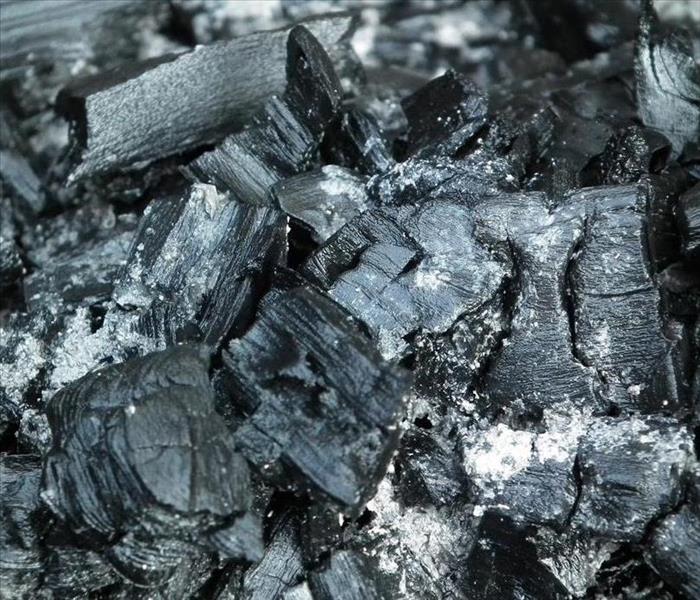 Soot is easier to see and looks like a black powder substance. Soot will find its way into your floors, walls, and furniture.
Soot is easier to see and looks like a black powder substance. Soot will find its way into your floors, walls, and furniture.
A house fire can be a catastrophic event for a family. Not only can a fire destroy much of your home but you may even lose precious belongings that are not replaceable. Once the fire is extinguished you are left with water, smoke, soot, and damage materials to clean up. The smoke that fills your home can leave a horrible odor and in some cases can harm your home and those who live in the home. It is imperative to clean up the home and get it back into proper shape as soon as possible.
Types Smoke Damage
Smoke Residue
Smoke damage has to be mitigated. It does not go away on its own. Smoke residue can get into your walls, carpet, and furniture. The only way to get rid of the residue of smoke is to have a professional come out and clean it. The smoke residue leaves a bad smell and can discolor walls, and other materials.
Soot
Soot will settle into the home a lot like smoke residue. Soot is easier to see and looks like a black powder substance. Soot will find its way into your floors, walls, and furniture. Soot is a byproduct of fossil fuels burning. It is usually a mix of acid, dust, and various other chemicals. This can be dangerous for those who live in the home.
Smoke Damage
Smoke damage can cause many issues for the structure and those living in the home. Ceilings, walls, and floors can become discolored. Metals and appliances can become tarnished and start to rust. Marble and granite can become permanently discolored.
Smoke Damage can have a serious impact on health as well. Those who live in the home may experience skin irritation, eye irritation, and respiratory issues. These issues may require medical attention and should be taken seriously.
After the fire in your home has been extinguished, contact SERVPRO of Citrus Heights / Roseville and Carmichael to clean up and restore the damage in your home. Call (916) 966-2601.
Candles and Fire Safety
2/6/2020 (Permalink)
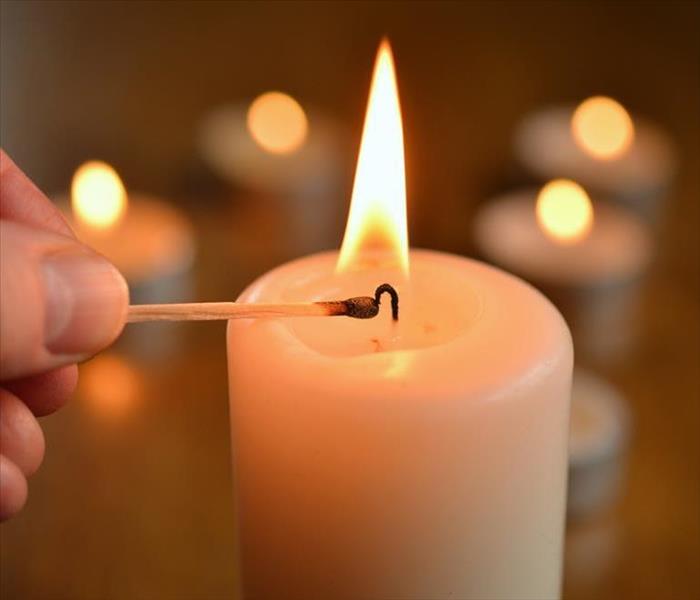 Use long matches or a long reach lighter to light your candle.
Use long matches or a long reach lighter to light your candle.
Candles bring a special calming nature. One-third of home candle fires start in the bedroom, and more than half of these fires are from being too close to other materials. Candle safety is vital for staying safe from fires at home.
Basic Candle Care
- Keep candle wicks to ¼ inch in length or less
- Follow candle manufacturer instructions if available
- Place candles on a flat and sturdy service
- Do not burn a candle if medical oxygen is in use
- Keep candles away from pets and children
Lighting and Burning Candles
- Use candle holders
- Use long matches or a long reach lighter to light your candle.
- When lighting a candle, ensure hair is put back and loose fit clothing is pulled back as well.
- Keep lit candles 12” away, or more, from any other materials
- Keep lit candles away from drafts, vents or air currents.
- Do not move candles while they are lit.
- Don’t burn candles too far down. Typically, a candle should not be used after ½ inch is only left, for pillar candles, the length should not be less than 2 inches.
- If burning multiple candles at once, ensure they are at least three inches apart. Doing so will ensure the candles burn properly.
Extinguishing a candle
- When putting a candle out, use a candle snuffer.
- Don’t use water to put a candle out as water can cause splattering.
- Put candles out when leaving the room or when going to sleep.
These candle fire safety tips should come in quite handy. These are preventive measures to keep your home safe from candle fires.
Home Heating Fire Safety Tips
1/31/2020 (Permalink)
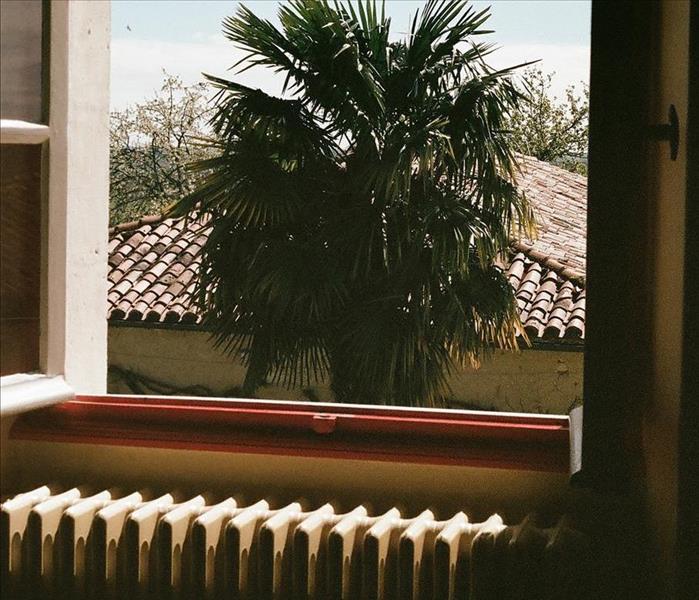 Home heating equipment causes many fires.
Home heating equipment causes many fires.
Home heating equipment causes many winter fires and is a leading cause of home fire deaths. Space heaters account for 4 out of 5 home heating deaths according to recent U.S. studies. There are preventative measures to help prevent home-related heating fires.
- Keep all items at least three feet away from any heating equipment such as fireplaces, wood stoves, baseboard or portable space heaters.
- Do not use an extension cord with a portable heater, these need to be plugged into an outlet.
- Ensure your space heater has an auto shut off just in case the unit tips over.
- Make sure heating equipment and chimneys are cleaned and inspected yearly.
- Ensure your fireplace is equipped with a sturdy screen, this will prevent sparks from flying from the fireplace onto materials that can start a fire.
- Do not use your oven to heat the home.
- Turn off portable heaters when you leave the room or go to bed.
Your family, home, and safety are very important. Keep your home safe with these home heating fire safety tips, ensuring to prevent home fires.
Top Fire Damage Restoration Tips
1/26/2020 (Permalink)
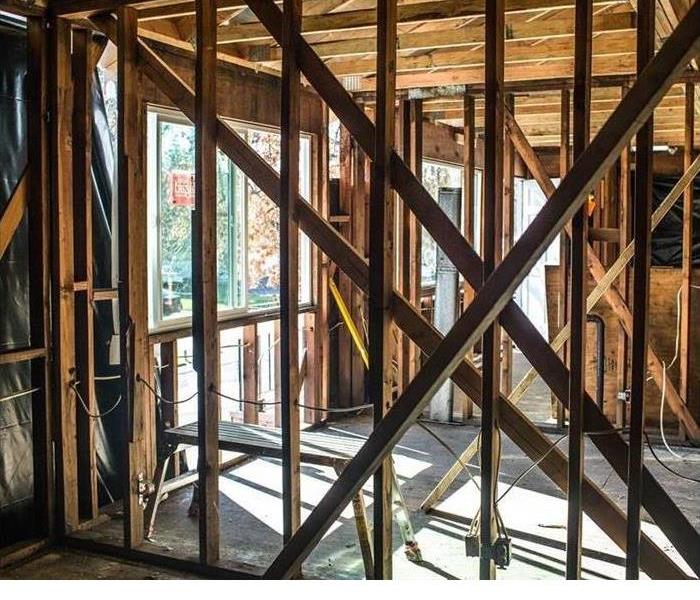 Three of four units in this Sacramento home was damaged and our crews had to tear the structure down to the studs.
Three of four units in this Sacramento home was damaged and our crews had to tear the structure down to the studs.
Fires in California are very common. As common as fires are, one is never fully prepared for a fire. A fire can devastate a family, a business, and even whole communities. This catastrophe can be a life-changing event. People lose family members and loved ones to fires, and those may even lose their home or their businesses. Some may never fully recover after a fire. Even those that have minimal fire damage suffer greatly.
Fire damage is costly and very dangerous. Professional cleaning and restoration services are needed. You may attempt to restore yourself, there are special equipment and cleaners needed as ash and soot leave behind many toxins and can cause many health issues. There are a few things that could be completed by yourself.
Fire Damage Tips
- Contact your insurance company and then contact a professional fire mitigation and restoration service provider.
- Until help arrives, limit activity. Until the home is restored limit activity in the home. Movement in the home can cause soot from the fire to travel through the home. Soot particles can become embedded in upholstery and carpets, causing even more damage.
- With fire comes water, with water comes mold and mildew. After the fire trucks leave, make sure you air out every room affected and clean out any vents and filters if it is simple enough to access. Mold and mildew can contaminate your furniture, carpets, clothing, mattresses, walls, and even more. Again, limiting movement in the structure is ideal.
- Clothing must be dry cleaned. Do not throw clothing exposed to smoke in the washer machine.
- Dishes must be cleaned thoroughly as they come into contact with your food. Scrub them well and let them soak well. If you can’t seem to wash the soot away, throw the dish away. Do not chance it.
Leave the fire mitigation and restoration to a professional service provider like SERVPRO of Citrus Heights / Roseville and Carmichael. Floors, walls, structure materials, and your belongings need special care. Our team will take care of your fire damage needs
.
Your Guide to Fire Safety in the Home | SERVPRO® of Citrus Heights/Roseville
1/22/2020 (Permalink)
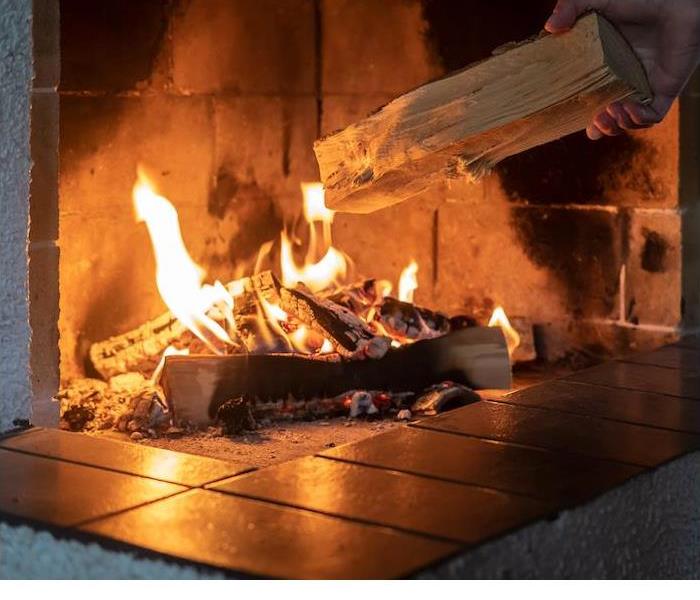 A house fire can occur when you least expect it. SERVPRO of Citrus Heights/Roseville is on call 24/7.
A house fire can occur when you least expect it. SERVPRO of Citrus Heights/Roseville is on call 24/7.
House fires are a chief concern for individuals, and with good reason. Not only can fires impact your home, damaging its structure and its contents, but they can also cause injuries and fatalities to you and your loved ones if safety precautions are not taken into account.
Thankfully, there is a variety of information about how to improve your fire safety efforts around the house. In order to make it easier to find and recall this information, we have put together a guide that features the top fire safety tips all in one place for your reference.
Increase Fire Safety in Your Household
Frequently Check Smoke Detectors. Making sure that smoke alarms are installed and operational is one of the most effective ways to increase your fire preparedness. Install one smoke alarm per room. Choose a model with an interconnected system for best results and test them monthly.
Have a Fire Escape Plan. Creating and rehearsing a fire escape plan for your home will help every member of your household know how to react quickly when a fire occurs. Designate two exits from each room and an outdoor meeting place for everyone to reconvene.
Know How to Operate a Fire Extinguisher. There are many types of fire extinguishers on the market, and it is important to select the right one for your needs. Make sure to store it in an easily accessible location and educate everyone in the home on how to use it.
Never Leave Flames Unattended. Open flames are part of many people’s everyday lives. Between stoves, candles and other fire sources, it can be easy to forget that even these small flames pose a serious risk. Never let flames go unattended in a room to minimize the risk of them spreading out of control while you are away.
Keep a Closed-Door Policy. Fire safety is important even when you are sleeping. Shutting doors to bedrooms at night is a great way to stop the flames from spreading as quickly through the home, giving you far more time to execute the fire escape plan once the alarm sounds.
If you’d like to learn more about protecting yourself from a house fire and how our restoration services can help you recover, get in touch today to learn more.
Most Common Places a House Fire Starts
1/17/2020 (Permalink)
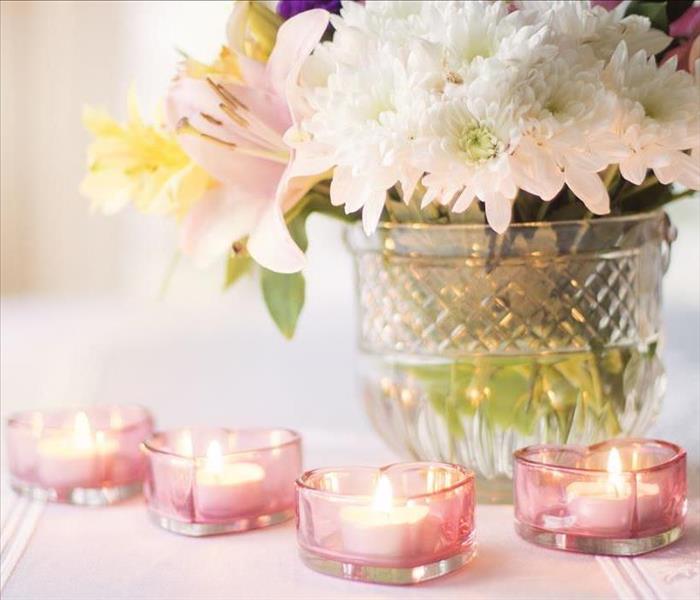 Candles cause many house fires.
Candles cause many house fires.
Fires are usually caused by negligence, open flames, and cooking. According to safewise.com, of all fires in the United States, 31% happen in residential homes. To prevent fires, it is best to understand the main causes and where fires normally start in the home.
Most Common Places a House Fire Originates
- The Kitchen
Half of the fires started in the home begin in the kitchen. That makes perfect sense as cooking takes place in the kitchen and many household appliances are in the kitchen. Using safety precautions when cooking is key and watching after the stove and flammable items in the kitchen can help prevent fires in the kitchen.
- The Bedroom
The bedroom is the second most common place a fire originates at in the home. Mattresses and plush objects like stuffed animals and pillows can catch on fire quickly. Newer mattresses are helped to the Federal Mattress Flammability Standard. If your mattress is older than a 2007 model, the best thing to do would be to replace it. Candles are a huge factor for bedrooms, do not leave lit candles unattended. Do not forget to turn off space heaters and other heating equipment like heating blankets and pads.
- The Chimney
Many fires happen in the chimney and surrounding the fireplace. Chimneys must be serviced and cleaned regularly. Keeping your chimney cleaned and serviced can help prevent a fire in your house.
- The Living Room
Living rooms house candles, fireplaces, electronics, and heating equipment. Couches, rugs, and drapes are flammable and can cause a fire.
- The Laundry Room
Dryer lint is the main culprit for laundry room fires. Clean vents and filters regularly. The heat from the dryer can easily cause dryer lint to catch fire. Try not to run your washer or dryer when not at home.
- Outside the Home
Fires often happen out on the patio where you may grill your food or where one may have a fire pit or small bonfire. Fireworks are a huge factor in home fires as well.
- The Attic
Ensure your home is to code when it comes to insulation and electric standards. Dangerous wiring can cause a fire.
If there is a fire in the home, you will need to hire a professional fire mitigation and restoration company. SERVPRO of Citrus Heights / Roseville and Carmichael are fully trained to clean up and restore your home if there is a fire.
Picking a Restoration Company That Works for You | SERVPRO® of Citrus Heights/Roseville
11/7/2019 (Permalink)
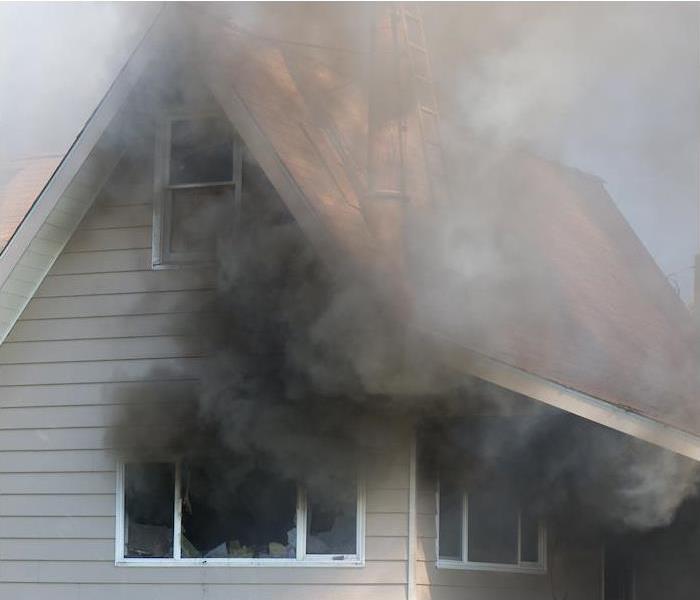 Having a team on your side after a disaster can help relieve stress. SERVPRO of Citrus Heights/Roseville is here to help when a fire strikes.
Having a team on your side after a disaster can help relieve stress. SERVPRO of Citrus Heights/Roseville is here to help when a fire strikes.
Homeowners are always encouraged to practice fire preparedness, but with winter approaching, now is an optimal time. The Red Cross has found that the most common time for home fires is winter.
While homeowners are advised to prepare for the moment of a house fire by creating an emergency escape plan, care should also be taken to plan for after the fire, too. By knowing what restoration company to work with, you will know who to call immediately after the flames are extinguished to begin reclaiming your home.
The 3 Main Elements of Fire Cleanup
Fires do not discriminate in what they damage, tearing through anything that is in their path. That is why choosing a restoration company that can clean your structure, contents and air quality are vital. By doing a thorough restoration, you can reclaim your home and recover from the traumatic events of a house fire. Here are the types of cleanups we specialize in:
Structural Cleaning
The structure of your home can become dangerously damaged in a fire, especially if supporting walls or beams are affected. We have thorough testing processes that will allow us to assess how far the damage spreads and how severe it is. Then we will bring in our equipment to begin cleaning and reconstructing these elements of your home.
Content Cleaning
The contents of your home are important, and so is restoring them to their pre-fire condition. In many cases, this will be less expensive than fully replacing your belongings, and by utilizing both wet and dry cleaning methods, we can restore a variety of things. Whether you have fire-damaged art, upholstery, electronics or area rugs, we will be able to restore most of your belongings.
Deodorization Services
Lingering smoke and soot after a fire might cause unpleasant odors, but they can also cause negative health effects. For this reason, air quality cleanup is a very important part of the restoration process. By bringing in foggers and air scrubbers, we are able to fully remove these particles in lieu of simply covering up the scent.
If you’ve been affected by a fire, reach out to us right away! We are here 24⁄7 to help you recover.
Extension Cord Safety
2/28/2019 (Permalink)
Every year around 3,330 homes fires are caused by extension cords. This results in about 50 deaths and over 250 injuries. These fires start when extension cords overheat when they are not used properly. Keep these tips in mind to help prevent extension cord fires.
- Do not overload extension cords with plugs.
- Check that they are not damaged. There should be no frayed sockets, loose wires, bare wires, and no cracks.
- Do not run cords through walls or ceilings. If the cord is covered the heat cannot escape and result in a fire.
- Never force a fit by cutting off parts from a three-prong plug to fit into a two-slot outlet.
- Make sure the extension cords are used for their intended purpose such as indoor or outdoor use.
- Do not use a power strip with heaters or fans because they can over heat.
Your home is filled with electric powered items so always be sure to use proper extension cord safety.
Evacuation Plans For Fire Emergencies
2/26/2019 (Permalink)
Having an evacuation plan in place can help saves lives and property. When a fire emergency happens, a frenzy can happen causing confusion, injury, and property damage.
It is important to know in case of an emergency whether evacuation is necessary, or one should shelter in place. This is true for both commercial and residential buildings.
In commercial buildings you must make sure employees have knowledge of the exit and routes in case of emergencies. Fire can spread quickly, and the smoke caused by fire can quickly subdue a person so immediate evacuation is critical. Make sure to accommodate instructions to people with disabilities and people who do not speak English. When developing this plan, it is also important to consider a safe designated area where they should remain once they have evacuated the building.
Be sure to have a means of accounting for your employees. You need to make sure all have exited the building or be able to inform emergency response teams.
If an emergency does happen be sure to call the fire damage experts at SERVPRO of Citrus Heights/Roseville. (916)966-2601
Restore Versus Replace
2/25/2019 (Permalink)
After a fire your first instinct might be to want to clean up as soon as possible but you might be inadvertently causing more damage to your property and valuable. At SERVPRO of Citrus Heights/Roseville we pride ourselves in restoring as much as possible instead of replacing your property.
Do Not
Do not wash walls or painted surfaces. Using improper techniques or products can spread soot particles or create further damage.
Do not shampoo your carpet or upholstery. Leave this to the professionals.
Do not clean any electrical equipment. This could be dangerous to your family.
Do not send clothing or cloth materials to dry since it may set smoke odor if not done correctly.
As tempting as it may be to want to start the clean up after a fire it is best to leave it to the professionals at SERVPRO of Citrus Heights/Roseville.
Avoid a Fire in Your Roseville Home
2/21/2019 (Permalink)
Fires can cause devastating damage to your home and property. In worst case scenarios it can even result in injury or harm to people. Below are the most common causes of residential fires.
Candles – Unattended candles are one of most common causes of fires. The holidays are the peak season for candle fires. Always make sure to store candles away from any items.
Cooking Equipment – Cooking brings people together but when cooking equipment is not handled properly it can cause a fire in your home. Fryers are the top cause of residential fires. Make sure to keep mittens and cloth materials away from stovetops. Periodically check on your food to make sure it is not burning.
Heating – Heating equipment such as furnace or heater are one of the leading causes of home fire deaths. Keep an open space between the heating equipment of about three feet. Never use your oven to heat your home.
Smoking – Fire can easily start from the small embers of a cigarette. To avoid smoking related fire hazards always be careful when disposing of cigarettes. Never smoke in bed or in your car.
Children – Children accidently start fires that result in severe damage or worse. Make sure to teach kids not to play with lighters or matches. Children should also be taught how to respond to smoke alarms and use proper escape routes.
To help prevent fires in your home, install smoke alarms, carbon monoxide detectors, as well as a fire sprinkler system. For professional fire, water and mold restoration services, contact the professionals at SERVPRO of Citrus Heights/Roseville for all of your needs.
Soot Removal by SERVPRO of Citrus Heights/Roseville
2/21/2019 (Permalink)
Soot is a black residue that is left behind when various materials are burnt such as plastics, synthetics, foam and wood. It can easily spread and it important to not touch the soot until the SERVPRO of Citrus Heights/Roseville professionals arrive. You can be making it worse.
Removing Soot
SERVPRO of Citrus Heights/Roseville uses the appropriate techniques to address the soot issue. Depending on the source of the soot different techniques are applied. Dry sponge or wet sponge methods are applied based on the recommendations of our experts.
At SERVPRO of Citrus Heights/Roseville we are trained and certified to mitigate and clean structures affected by fire or smoke, to request an inspection call us at (916)966-2601 or go to www.SERVPROcitrusheightsroseville.com.
Driving Force in Fires
4/2/2018 (Permalink)
The devastating effects of fire have been prominent in recent years. They can cause millions of dollars in damage and worse they can cause fatalities.
The driving force behind these fires are the dry conditions and the winds. The most common causes of fires are power lines being blown down and arson. Once ignited the dry conditions are fuel to the fire. They spread fast and without warning. Fires are usually about 16 to 20 kilometers per hour. Strong winds in California make it move even faster.
Fires can go on for weeks as we seen last year. It is important to be always stay informed during fire emergencies. To take some precautionary measures for your home, it is recommended to assess your home and property. Try to reduce the amount of material that can burn easily in and around your home by clearing away debris.
There is not much to do when it comes to a wild fire but keeping you and your family safe is the top priority.
Evacuation Plans in Fire Emergencies
2/26/2018 (Permalink)
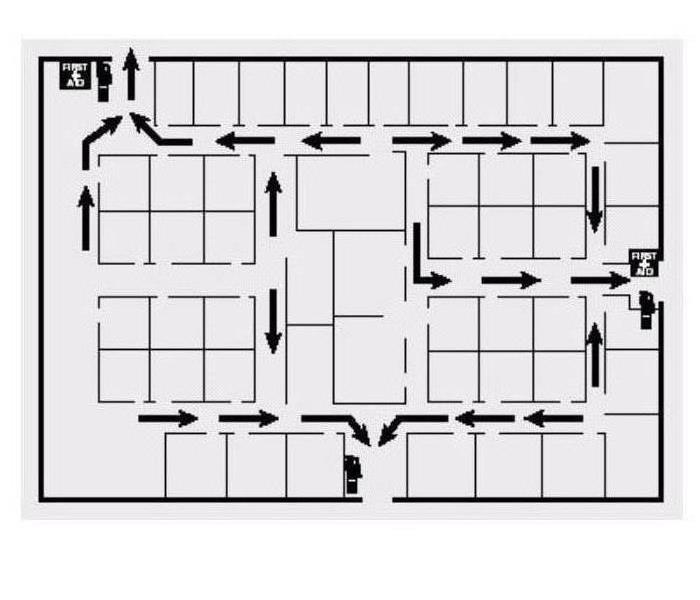 Image Copyright OSHA
Image Copyright OSHA
Having an evacuation plan in place can help saves lives and property. When a fire emergency happens, a frenzy can happen causing confusion, injury, and property damage.
It is important to know in case of an emergency whether evacuation is necessary, or one should shelter in place. This is true for both commercial and residential buildings.
In commercial buildings you must make sure employees have knowledge of the exit and routes in case of emergencies. Fire can spread quickly, and the smoke caused by fire can quickly subdue a person so immediate evacuation is critical. Make sure to accommodate instructions to people with disabilities and people who do not speak English. When developing this plan, it is also important to consider a safe designated area where they should remain once they have evacuated the building.
Be sure to have a means of accounting for your employees. You need to make sure all have exited the building or be able to inform emergency response teams.
If an emergency does happen be sure to call the fire damage experts at SERVPRO of Citrus Heights/Roseville. (916)966-2601
Restoring Versus Replacing After a Fire in Your Roseville Home
2/23/2018 (Permalink)
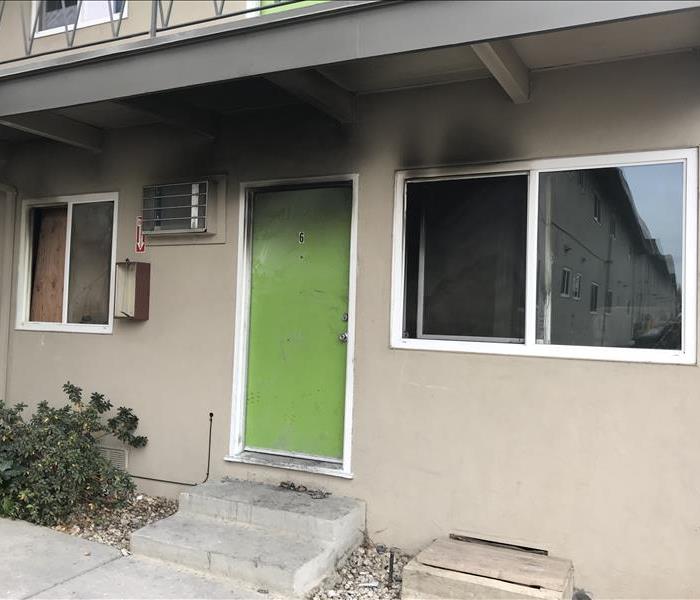 Leave fire damage restoration to the professionals at SERVPRO of Citrus Heights/Roseville
Leave fire damage restoration to the professionals at SERVPRO of Citrus Heights/Roseville
After a fire your first instinct might be to want to clean up as soon as possible but you might be inadvertently causing more damage to your property and valuables. At SERVPRO of Citrus Heights/Roseville we pride ourselves in restoring as much as possible instead of replacing your property.
Do Not
Do not wash walls or painted surfaces. Using improper techniques or products can spread soot particles or create further damage.
Do not shampoo your carpet or upholstery. Leave this to the professionals.
Do not clean any electrical equipment. This could be dangerous to your family.
Do not send clothing or cloth materials to wash since it may set smoke odor if not done correctly.
As tempting as it may be to want to start the clean up after a fire it is best to leave it to the professionals at SERVPRO of Citrus Heights/Roseville.
Fire Damage near you
4/6/2017 (Permalink)
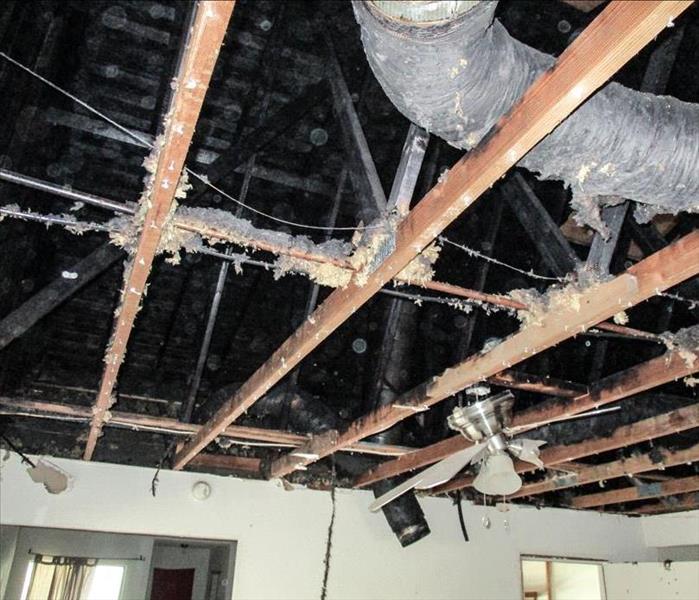 Fire Damage in Citrus Heights
Fire Damage in Citrus Heights
While the last thing anyone would ever want to do is take something away from the services that our firefighters perform on a daily basis, putting the fire out is only the beginning. Homeowners often get stuck with communicating damages that they do not understand, to a restoration company they do not know or have never used before. How can you tell whom to trust?
First, it is never too early to contact a local restoration company near Hillcrest to discuss fire damage or other services that they have available. The company you contact should be more than willing to explain what they can do for you and answer any questions that come to mind.
Take the time to research your local company fully, discover everything you can about them and make sure that you feel comfortable about using them before you let them perform any restoration services on your property. It does not hurt to form a relationship with a company, like SERVPRO, before emergency issues become necessary, the right company is willing to help you prevent as well as recover.
Just keep in mind that checking for certifications is important, the company you use should be IICRC certified and follow rigorous safety and restoration guidelines provided by the EPA and OSHA. These certifications show proof that the technicians performing repairs in your home have the correct training and specialize in restoring your home to a quality condition.
SERVPRO offers a variety of services including, fire, water, storm, and mold remediation services. They help you manage the entire situation from beginning to end and help you get things under control quickly. However, one of the most valuable services anyone can offer is safety.
Before any work begins on your property, SERVPRO technicians fully inspect the surrounding area looking for any possible hazards that exist. Electrical, structural, and slip – trip and fall hazards are all too common. Keeping you, your family, and our team of technicians safe during your restoration process takes priority.
Looking for help with fire damage restoration, contact us for help. SERVPRO of Carmichael can give you the services you need and get you the peace of mind you deserve. (916) 967-2500
What happens after your Roseville Fire
3/31/2017 (Permalink)
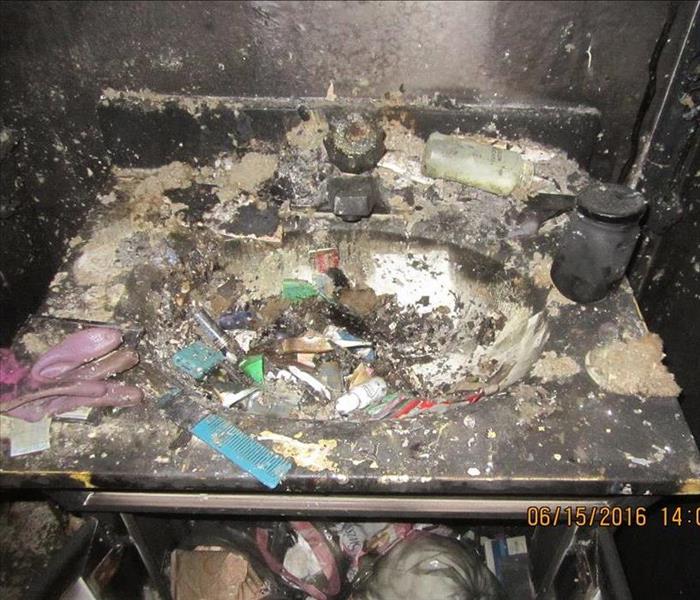 Recent fire damage to a Residential Property.
Recent fire damage to a Residential Property.
In 2016 Sacramento Metropolitan Fire Department reported a total of 2,662 confirmed fires for the prior year, that’s approximately 7 fires a day in the Sacramento Area. The 17 year old fire department utilizes 37 Fire Engines, 27 Ambulances, and over 40 other special purpose vehicles to protect an expanse including Antelope, Carmichael, Citrus Heights, Elverta, Fair Oaks, Florin, North Highlands, Orangevale, Rancho Cordova, Rio Linda, Rosemont, Sacramento, Sloughhouse, Vineyard and McClellan Airfield.
The Roseville Fire Department; with an estimated 128,000 people living within its 36 square miles of jurisdiction, keeps it’s 8 fire engines at ready to respond to more than 12,000 emergency calls every year.
It’s likely that you or someone you know has had a very bad day, and the brave men and women of the fire department were there to help, and for that we can all be grateful.
But what happens next?
First visit our page on what to do immediately after you've experienced fire damage.
When it comes to cleaning and remediation of property with fire damage, SERVPRO of Citrus Heights / Roseville first determines which cleaning methods to use on the various surfaces and materials in a structure. Structural items include framework, ceilings, doors, windows, floors and floor coverings, bath fixtures, cabinets, light fixtures and the HVAC system. In simple terms, if something can't be carried out of a building, it is considered structure.
All materials and surfaces fall into two categories: Washable and Non-Washable.
Washable - These materials and surfaces can be cleaned using a water-based cleaning product. This is possible because using one will not further damage the item or surface (floor or wall) being cleaned. We maintain an extensive inventory of cleaners for every type.
Non-Washable - These are materials and surfaces that cannot be cleaned using a water-based cleaning product. Doing so would cause further damage to the material or surface. Non-washable methods include dry solvent, dry sponges/cloths, and vacuums.
Over the years, SERVPRO of Citrus Heights / Roseville has seen many examples of what can happen when an unqualified company or individual tries to tackle fire damage restoration. The assumption, for many, is that cleaning and removing damaged items is easy. The truth is it’s hard work that requires special equipment and techniques. SERVPRO of Citrus Heights / Roseville technicians are highly trained in property restoration. From initial and ongoing training at SERVPRO's Corporate Training Facility to regular IICRC industry certifications, our Professionals are equipped with the knowledge to restore your property.
Have Questions about Fire, Smoke, or Soot Damage?
Call Us Today – (916) 966-2601
Even Small Fires can Create a Lot of Smoke and Fire Damage in Sierra Vista
12/29/2016 (Permalink)
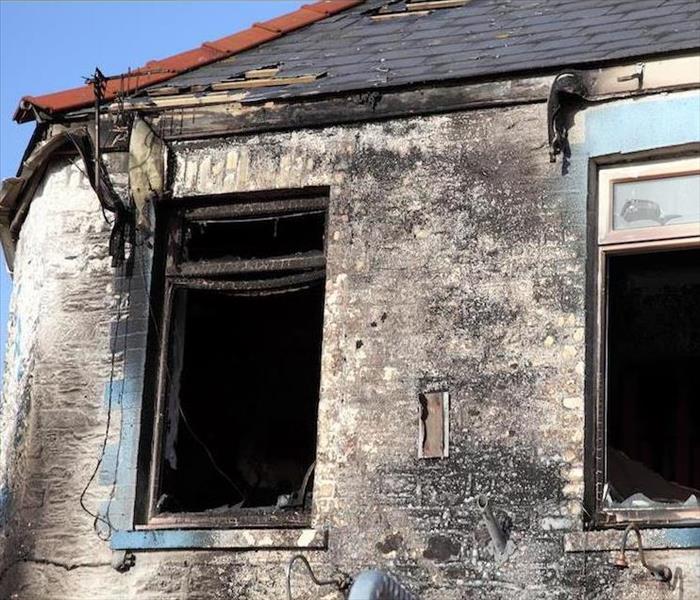 Small fires can produce considerable damage. Call SERVPRO after any fire damage.
Small fires can produce considerable damage. Call SERVPRO after any fire damage.
SERVPRO Technicians Can Remediate Both Fire and Smoke Damage
Many house fires begin in the kitchen as small fires that then spread out of control and into other areas. When a small fire starts, being able to extinguish it before it can spread can help save your home. It does not take much of a blaze to cause substantial amounts of smoke and fire damage.
While the fire may have been in a rather small area, Sierra Vista residents will often notice that smoke damage covers a much larger area in their home than the fire damage does. SERVPRO technicians engage in ongoing education that prepares them for these and other situations that can damage your home, regardless of the size.
Fire damage caused by kitchen fires often produces oily smoke that adheres to almost everything in your home. Along with this heavy smoke, odors can permeate into your wood paneling, carpeting, and furniture. Because this type of odor is caused by solid particulates that will take a very long time to break down, the smell can be overpowering at times, especially when the humidity or temperature is elevated.
In addition to repairing burned and scorched walls, cleaning smoke-infused curtains and draperies, and cleaning your carpets after a small fire, SERVPRO technicians are able to also eliminate much, if not all, of the odor. Much of this odor elimination will be done by our carpet cleaning technician's (CCT) work, but a great portion of the smoke will be in other areas of your home.
Odor elimination can be carried out in several ways, including the injection of your carpeting in strategic patterns with deodorizing liquids, equipment that produces ozone, which will break down solids much more quickly than normal, or gel packs that are placed in locations inaccessible to children or pets so that their contents can slowly be released into the air.
If you have recently had a small, or large, fire in your home and want to repair the damage, call SERVPRO of Citrus Heights / Roseville, 24/7, at (916) 966-2601. We can help you regain the comfortableness of your home again, from top to bottom, while satisfying both your eyes and nose.
SERVPRO Cleans Fire Damage In Citrus Heights
10/26/2016 (Permalink)
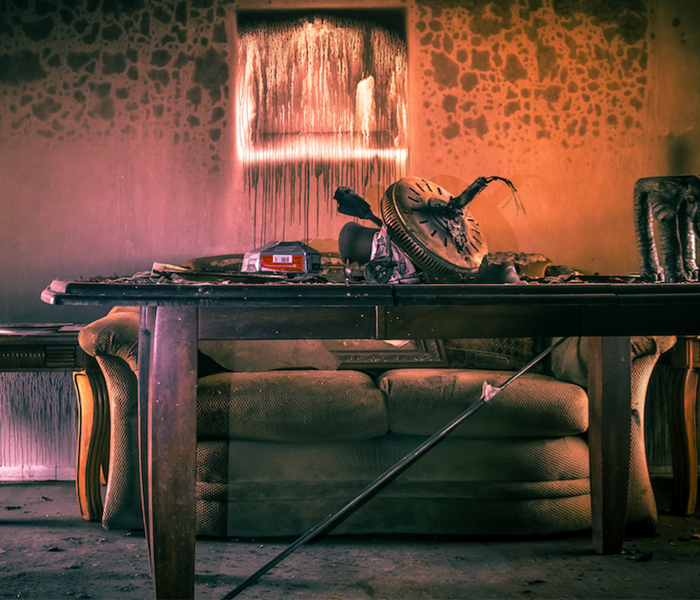 SERVPRO can find the right cleaning method for your fire damaged items! Call today!
SERVPRO can find the right cleaning method for your fire damaged items! Call today!
Technicians Use the Appropriate Method to Clean Each Material Type
When your home has suffered fire damage, many of your possessions will need to be cleaned. SERVPRO technicians are trained in a range of methods matched to the type of material that shows signs of soot, dirt, and residue from chemicals used to fight the fire. During the cleaning and restoration process, you will see a variety of different strategies used to clean the contents of your home depending on the best way to remove fire damage from each type of item. Your technicians will share with you the reasons certain techniques are better for some items than others. We carefully assess each situation presented inside your house and proceed according to our certifications and experience.
The range of techniques used for fire damage in Citrus Heights moves from gentle to aggressive, each type selected by the degree of soiling and the characteristics of the materials affected. Light soiling and pretreating for more intensive cleaning often involves a dry cleaning with dusters, vacuums or special sponges. Surfaces that are solid yet permeable may receive a spray and wipe treatment with water or our cleansers to clean while limiting added moisture. Special circumstances call for the use of foam cleaning, often employed on absorbent materials like upholstery and bedding. If an item can be saturated without further harm, our technicians may use plain water or add in a cleaning agent to thoroughly remove heavy deposits of soot and other residues from some materials.
When an item is significantly coated with soot or a thick mixture of smoke, dirt and chemical residues we may need to use abrasive products and methods to remove the effects of the fire. Our staff is trained to use all due caution with this method as it can harm finishes, the technician achieving a balance between effective cleaning and limiting damage to your possessions. If appropriate, SERVPRO also offers immersion cleaning for objects that can handle being soaked. We also use ultrasonic tanks that combine cleaning solutions and water with the power of sound waves and heat to clean items. Special training is required to complete ultrasonic cleaning successfully, and our team will always include staff who are experienced and certified in this technique. A one-size-fits-all approach is never used when we commit to cleaning your fire damaged possessions.
A personalized approach to fire damage cleaning is what you receive from SERVPRO of Citrus Heights / Roseville. Call for an inspection at (916) 966-2601, and we will respond within hours 24/7.




 24/7 Emergency Service
24/7 Emergency Service






























